#summarize each arc
Explore tagged Tumblr posts
Text
i finished the sketch :3 i have to time it all out and. redraw it nice. but also i have work today so who knows when ill finish it lol <3
#my post#its based on that one dream sweet tma animation. like same format#its just scrolling images#smiles#its so fun#i did NOT try to fit in as many references and moments as i could bcus i would lose my mind actually. theres jusr like. 1 or 2 bits to#summarize each arc#and random things i threw in when i remembered a bit id forgotten#guys i almost forgot to include elrapids#AND TFTSMP??? I FUCKIN LOVE TFTSMP HOW DID I FORGET HER#its ok though theyre in here <3#also included lil nas x bcus hes the most important lore. sorry if i forgot your favorite character but lil nas x was the priority. you#understand
4 notes
·
View notes
Text
The Telling Truth: When 'Show, Don't Tell' Doesn't Apply (You Don't Always Have To Show, Don't Tell.)
Hey there, fellow writers and beloved members of the writeblr community! 📝✨
Today, I want to talk about something that's been on my mind lately, and I have a feeling it might resonate with many of you too. It's about that age-old writing advice we've all heard a million times: "Show, don't tell." Now, don't get me wrong – it's great advice, and it has its place in our writing toolbox. But here's the thing: it's not the be-all and end-all of good writing. In fact, I'd argue that sometimes, it's perfectly okay – even necessary – to tell rather than show.
First things first, let's address the elephant in the room. The "show, don't tell" rule has been drilled into our heads since we first picked up a pen (or opened a Word document) with the intention of writing creatively. It's been repeated in writing workshops, creative writing classes, and countless craft books. And for good reason! Showing can create vivid, immersive experiences for readers, allowing them to feel like they're right there in the story.
But here's where things get a bit tricky: like any rule in writing (or in life, for that matter), it's not absolute. There are times when telling is not just acceptable, but actually preferable. And that's what you all will explore today in this hopefully understandable blog post.
Let's start by breaking down why "show, don't tell" is so popular. When we show instead of tell, we're engaging the reader's senses and emotions. We're painting a picture with words, allowing the reader to draw their own conclusions based on the details we provide. It's a powerful technique that can make our writing more engaging and memorable.
For example, instead of saying "Sarah was angry," we might write, "Sarah's fists clenched at her sides, her jaw tight as she glared at the broken vase." This gives the reader a clearer image and allows them to infer Sarah's emotional state.
But here's the thing: sometimes, we don't need or want that level of detail. Sometimes, efficiency in storytelling is more important than painting an elaborate picture. And that's where telling comes in handy.
Imagine if every single emotion, action, or piece of information in your story was shown rather than told. Your novel would probably be thousands of pages long, and your readers might get lost in the sea of details, losing sight of the main plot or character arcs.
So, when might telling be more appropriate? Let's explore some scenarios:
Summarizing less important events: If you're writing a story that spans a long period, you don't need to show every single day or event. Telling can help you summarize periods of time or less crucial events quickly, allowing you to focus on the more important parts of your story.
For instance: "The next few weeks passed in a blur of exams and late-night study sessions." This sentence tells us what happened without going into unnecessary detail about each day.
Providing necessary background information: Sometimes, you need to give your readers some context or backstory. While you can certainly weave this information into scenes, there are times when a straightforward telling of facts is more efficient.
Example: "The war had been raging for three years before Sarah's village was attacked." This quickly gives us important context without needing to show the entire history of the war.
Establishing pace and rhythm: Alternating between showing and telling can help you control the pace of your story. Showing tends to slow things down, allowing readers to immerse themselves in a moment. Telling can speed things up, moving the story along more quickly when needed.
Clarifying complex ideas or emotions: Some concepts or feelings are abstract or complex enough that showing alone might not suffice. In these cases, a bit of telling can help ensure your readers understand what's happening.
For example: "The quantum entanglement theory had always fascinated John, but explaining it to others often left him feeling frustrated and misunderstood." Here, we're telling the reader about John's relationship with this complex scientific concept, which might be difficult to show effectively.
Maintaining your narrative voice: Sometimes, telling is simply more in line with your narrative voice or the tone of your story. This is especially true if you're writing in a more direct or conversational style.
Now, I can almost hear some of you saying, "But wait! I've always been told that showing is always better!" And I completely get it. I'm a writer myself and prioritize "Show, Don't tell." in my writing all the time. We've been conditioned to believe that showing is superior in all cases. But we can take a moment to challenge that notion.
Think about some of your favorite books. Chances are, they use a mix of showing and telling. Even the most critically acclaimed authors don't adhere strictly to "show, don't tell" all the time. They understand that good writing is about balance and knowing when to use each technique effectively.
Take, for instance, the opening line of George Orwell's "1984": "It was a bright cold day in April, and the clocks were striking thirteen." This is a perfect blend of showing and telling. Orwell shows us it's a bright, cold day (we can imagine the crisp air and clear sky), but he tells us about the clocks striking thirteen. This immediate telling gives us crucial information about the world we're entering – it's not quite like our own.
Or consider this passage from Jane Austen's "Pride and Prejudice": "Mr. Bennet was so odd a mixture of quick parts, sarcastic humour, reserve, and caprice, that the experience of three-and-twenty years had been insufficient to make his wife understand his character." Here, Austen is clearly telling us about Mr. Bennet's character rather than showing it through his actions. And yet, it works beautifully, giving us a quick, clear insight into both Mr. Bennet and his wife.
The key is to use both techniques strategically. So, how can you decide when to show and when to tell? Here are some tips:
Consider the importance of the information: Is this a crucial moment in your story, a pivotal emotion, or a key piece of character development? If so, it might be worth showing. If it's more of a transitional moment or background information, telling might be more appropriate.
Think about pacing: If you want to slow down and really immerse your reader in a moment, show it. If you need to move things along more quickly, tell it.
Evaluate the complexity: If you're dealing with a complex emotion or concept, consider whether showing alone will be enough to convey it clearly. Sometimes, a combination of showing and telling works best for complex ideas.
Consider your word count: If you're working with strict word count limitations (like in short stories or flash fiction), telling can help you convey necessary information more concisely.
Trust your instincts (Important): As you write more, you'll develop a feel for when showing or telling works better. Trust your gut, and don't be afraid to experiment.
Now, let's talk about how to tell effectively when you do choose to use it. Because here's the thing: telling doesn't have to be boring or flat. It can be just as engaging and stylish as showing when done well. Here are some tips for effective telling:
Use strong, specific language: Instead of using vague or generic words, opt for more specific, evocative language. For example, instead of "She was sad," you might write, "A profound melancholy settled over her."
Incorporate sensory details: Even when telling, you can include sensory information to make it more vivid. "The room was cold" becomes more engaging as "A bone-chilling cold permeated the room."
Use metaphors and similes: These can help make your telling more colorful and memorable. "His anger was like a volcano ready to erupt" paints a vivid picture without showing the anger in action.
Keep it concise: One of the advantages of telling is its efficiency. Don't negate that by being overly wordy. Get to the point, but do it with style.
Vary your sentence structure: Mix short, punchy sentences with longer, more flowing ones to create rhythm and maintain interest.
Remember, the goal is to create a seamless narrative that engages your reader. Sometimes that means showing, sometimes it means telling, and often it means a artful blend of both.
It's also worth noting that different genres and styles of writing may lean more heavily on one technique or the other. Literary fiction often employs more showing, delving deep into characters' psyches and painting elaborate scenes. Genre fiction, on the other hand, might use more telling to keep the plot moving at a brisker pace. Neither approach is inherently better – it all depends on what works best for your story and your style.
Now, I want to address something that I think many of us struggle with: the guilt or anxiety we might feel when we catch ourselves telling instead of showing. It's easy to fall into the trap of second-guessing every sentence, wondering if we should be showing more. But here's the truth: that kind of constant self-doubt can be paralyzing and ultimately detrimental to your writing process.
So, I want you to understand and think: It's okay to tell sometimes. You're not a bad writer for using telling in your work. In fact, knowing when and how to use telling effectively is a sign of a skilled writer.
Here's some practical ways to incorporate this mindset into your writing process:
First Draft Freedom: When you're writing your first draft, give yourself permission to write however it comes out. If that means more telling than showing, that's absolutely fine. The important thing is to get the story down. You can always revise and add more "showing" elements later if needed.
Revision with Purpose: When you're revising, don't automatically change every instance of telling to showing. Instead, ask yourself: Does this serve the story better as telling or showing? Consider the pacing, the importance of the information, and how it fits into the overall narrative.
Beta Readers and Feedback: When you're getting feedback on your work, pay attention to how readers respond to different sections. If they're engaged and understanding the story, then your balance of showing and telling is probably working well, regardless of which technique you're using more.
Study Your Favorite Authors: Take some time to analyze how your favorite writers use showing and telling. You might be surprised to find more instances of effective telling than you expected.
Practice Both Techniques (Important): Set aside some time to practice both showing and telling. Write the same scene twice, once focusing on showing and once on telling. This can help you develop a feel for when each technique is most effective.
Now, let's address another important point: the evolution of writing styles and reader preferences. The "show, don't tell" rule gained popularity in the early 20th century with the rise of modernist literature. But writing styles and reader tastes have continued to evolve since then.
In our current fast-paced world, where people are often reading on devices and in shorter bursts, there's sometimes a preference for more direct, efficient storytelling. This doesn't mean that showing is out of style, but it does mean that there's often room for more telling than strict adherence to "show, don't tell" would allow.
Moreover, diverse voices in literature are challenging traditional Western writing norms, including the emphasis on showing over telling. Some cultures have strong storytelling traditions that lean more heavily on telling, and as the literary world becomes more inclusive, we're seeing a beautiful variety of styles that blend showing and telling in new and exciting ways.
This brings me to an important point: your voice matters. Your unique way of telling stories is valuable. Don't let rigid adherence to any writing rule, including "show, don't tell," stifle your natural voice or the story you want to tell.
Remember, rules in writing are more like guidelines. They're tools to help us improve our craft, not unbreakable laws. The most important rule is to engage your reader and tell your story effectively. If that means more telling than the conventional wisdom suggests, then so be it.
As I wrap up this discussion, I want to leave you with a challenge: In your next writing session, consciously use both showing and telling. Pay attention to how each technique feels, how it serves your story, and how it affects the rhythm of your writing. You might discover new ways to blend these techniques that work perfectly for your unique style.
Writing is an art, not a science. There's no perfect formula, no one-size-fits-all approach. It's about finding what works for you, your story, and your readers. So embrace both showing and telling. Use them as the powerful tools they are, and don't be afraid to break the "rules" when your instincts tell you to.
Remember, every great writer started where you are now, learning the rules and then figuring out when and how to break them effectively. You're part of a long, proud tradition of storytellers, each finding their own path through the winding forest of words.
Keep writing, keep growing, and keep believing in yourself. You've got this!
Happy writing! 💖✍️ - Rin T.
Before you go, why not join us at The Write Right Society? We're a supportive Tumblr community where writers lift each other up. Whether you're a newbie or a pro, we'd love to have you! Share your work, get feedback, and connect with fellow wordsmiths, writers and aspiring authors.

#thewriteadviceforwriters#creative writing#writing tips#on writing#writers block#how to write#writers and poets#writing#writeblr#writers on tumblr#amwriting#writing advice#novel writing#writing blog#writing characters#writing a book#writing community#fiction writing#writing help#writing ideas#writing prompts#writing reference#writing inspiration#writing resources#writing guide#writing software#writing tools#writing tips and tricks#writing life#romance writing
1K notes
·
View notes
Text
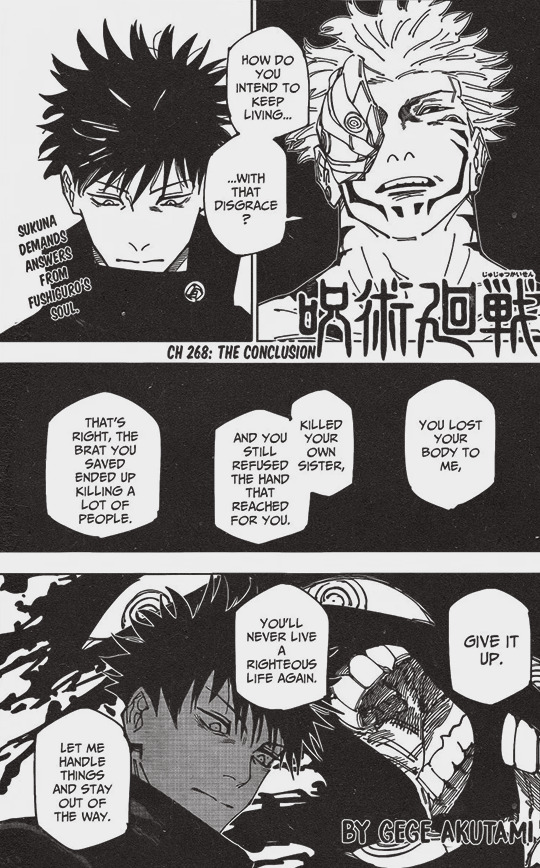
ONCE MORE, I THINK I'LL LIVE FOR OTHERS
So of all the characters in Jujutsu Kaisen Megumi has turned out to be one of the most controversial and hotly debated characters. There's nothing the internet hates more than a boy with trauma, I guess. Jujutsu Kaisen is a controversial work in general so it's not surprising that the ending wasn't super well received by the fans, especially in the way it decided to conclude Megumi's character arc.
There are many people accusing Gege of giving Megumi no character development. Of Megumi just choosing to replace Tsumiki with Yuji. Lots of complaints about Megumi never finishing his domain expansion among other things. Of Megumi being nothing more than a damsel for Yuji to rescue in the end. I'm here to say I think Megumi does have a complete character arc even if it didn't end the way I would have liked, and under the cut I'll be giving my thoughts for Megumi's ending and JJK's ending in general.
I CAN ONLY SAVE THOSE WHO ARE PREPARED TO BE SAVED
If you were to ask me what the most important arc in Jujutsu Kaisen is, it would be Hidden Inventory. Hidden Inventroy covers the inciting incident which leads to all the conflicts in the main story, Riko's death, Geto's defection, Tengen's merger failing, and Gojo's decision to adopt Megumi.
However, it also shows us what motivates Gojo in the main series, mainly his desire to raise this generation of students into strong and intelligent allies because of his inability to save his closest friend when it most counted.

If the quote that summarizes the central theme of Jujutsu Kaisen Zero is "Love is the most twisted curse of them all."
Then I put forward that the quote that summarizes the theme of the main series is what Gojo said to Yaga post Geto's defection, "Being strong isn't enough, I can only save those who are prepared to be saved."
Just like Hidden Inventory is centered around Geto and Gojo's relationship in their youth, the main manga itself centers around Megumi and Itadori's relationship. The manga itself starts with their first meeting. Yuji devours the finger in order to try to help Megumi. Megumi requests Gojo help save Yuji from execution because he didn't want to see another good person die.

Megumi and Itadori are also a deliberate parallel to Geto and Gojo's friendship in the past. To begin with Gojo tried to nurture these relatoinships in his students so they COULD get along and enjoy their youths the way he remembers doing so with Geto in his three springtime of youth.
He not only encourages Megumi to selfishly try to save Yuji even though it is against the rules of sorcery and poses a risk to other people, he also encourages them to socialize at every opportunity.
The strong and intense friendship that Megumi and Yuji enjoy is not only a clear parallel to Geto and Gojo's special connection with one another, but also the fact that a strong reocurring motif in Megumi and Yuji's friendship is their strong desire to save each other. Which is a clear parallel to Gojo's inability to save Geto in the past.
As I said for a long time Yuji and Megumi were being set up as this generation's version of the "strongest duo" except they were going to be able to break the cycle. Whether it be by Megumi saving Yuji, or Yuji saving Megumi, they wouldn't be driven apart by the corruption in the Jujutsu World the way that Geto and Gojo were.
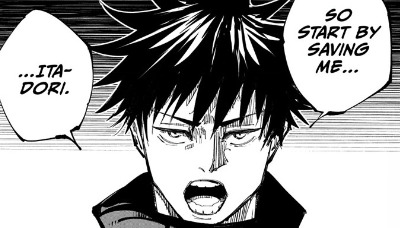
As I said the central question of Jujutsu Kaisen especially in regards to Megumi and Yuji's friendship is if it's possible to save someone who doesn't want to be saved. Which is why Megumi and Yuji both wanting to save each other is something that happens again and again at different parts of the manga. Whether it be the ending of Origin of Obedience where Megumi and Yuji are both unable to talk to each other because they want to try to protect the other from information that might harm them. Megumi hiding the fact that he knows resonance between the Sukuna fingers awakened the curses. Yuji hiding the fact that Megumi's decision to save Yuji has caused strong curses to awaken and kill other people.
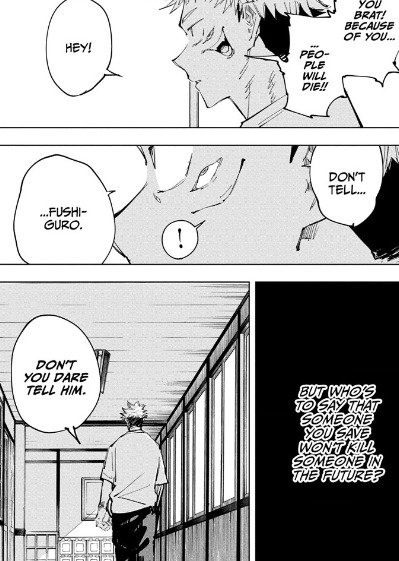
Just as often as these two try to save each other, they fail. Megumi watches Yuji die early on when Yuji takes back control from Sukuna and decides to die without a heart.
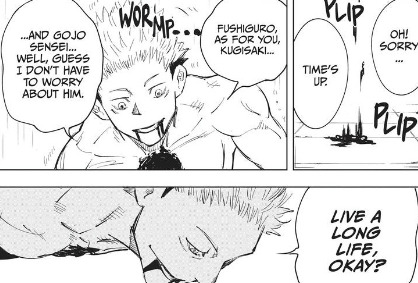
Megumi spends the entirety of the culling games clinging to Yuji's side no matter how Yuji tries to push him away because he knows Sukuna has plans for him. However, Megumi is afraid to leave Yuji alone because he knows Yuji is in a dark place after the Shibuya massacre and that if he's left alone Yuji might just find some way to off himself in a heroic sacrifice to try to atone for the people lost at Shibuya.

Only for Megumi's insistence on clinging to Yuji to backfire because Sukuna ends up taking his body from him in a critical moment. When Sukuna takes his body their circumstances swap and Megumi is the one who's body is being used to kill people by Sukuna. When Megumi has to live with the guilt of Sukuna using his body to kill both his sister and his teacher, he's not able to live with it anymore.
Then their positions swap completely and it's Megumi who wants to die to atone for the guilt, and it's Yuji who doesn't want to let go of Megumi and will do anything to save Megumi from both Sukuna and the other sorcerers even if the right thing to do is just kill both him and Sukuna and letting him live means putting the whole rest of the world at risk.
As you can see not only is saving each other a common theme of Megumi and Yuji's relationship, but at different points of the story both of them are trying to save the other even when the other doesn't value their own life.
Gojo's relationship with Geto is defined by his inability to reach his friend in time, and how he was "left behind" in the end.
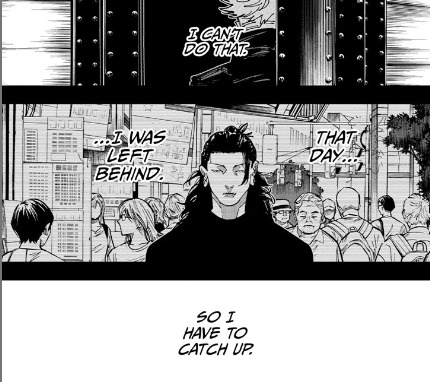
Gojo explicitly waited a year after learning about Megumi being sold to the Zen'in clan to do anything, and only decided to intervene after Geto's defection. Gojo's decision to mentor Megumi was inspired by Geto leaving. He even said "Don't get left behind."
His hope in taking in students like Megumi, Yuta and Yuji was twofold first that he'd be able to handpick and raise several strong students who would eventually replace the elders and reform the Jujutsu World. The second and more personal motivation is that he wanted these students to be able to support each other and be strong allies to one another so they wouldn't end up alone like Gojo did in his youth.

Gojo's intentions were good however, Gojo has a very flawed understanding of how people and relationships work. In Gojo's books "strong=good" and almost everything can be solved by strength. Notice just one chapter ago Gojo said that being strong wasn't enough, he can only save those who are prepared to be saved and yet one chapter later he tells Megumi that he needs to get strong otherwise he'll be left behind.
So, even when Gojo knows that being strong isn't enough and didn't make a difference with Geto, that's still the only real advice he can offer Megumi.
A big theme of Jujutsu Kaisen is the failures of the past generation affecting the present. A lot of people in trying to put Gojo on a pedestal fail to realize one of the central themes of this manga is GOJO WAS WRONG. The way Gojo went about doing several things wasn't the right way. Gojo wants the next generation to succeed him and do better than him, because Gojo himself knows that he was wrong and he's a part of the past generation.
I think a big part of the reason the conclusion to Megumi's character arc is poorly received is that Megumi didn't end his arc the way that Gojo set out for him.
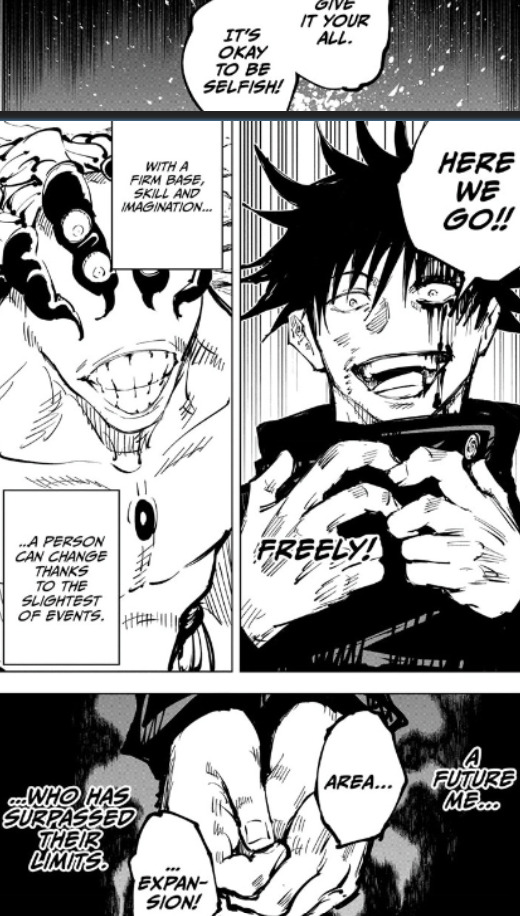
Scenes like this led the audience to believe that Megumi's character arc was going to be completed by him learning to be more selfish and living up to the potential that Gojo saw in him. That we were going to get a completed domain expansion. That Megumi was going to become stronger than Gojo because the ten shadows was the only technique to ever beat a wielder of the limitless and the six eyes.
I understand wanting to see Megumi living for himself, and how cool it might be to see Megumi's complete domain expansion after Gege teased us with this twice but I have to ask this.
If Gojo was the strongest sorcerer in the world, and that still wasn't good enough to save Geto. Then how would Megumi reaching his full potential as a sorcerer in any way help Megumi avoid making the same mistakes that Gojo did?
HAVEN'T WE HAD ENOUGH OF GOJO SATORU
I think a lot of dissatisfaction in Megumi's character development comes from he didn't really follow the path that Gojo set out for him. He didn't unlock his full domain expansion, he didn't learn to live more selfishly. They say that Megumi simply choosing to live for Yuji isn't him learning to stand on his own two feet because he's just hinging his self worth on someone else the same way he did with Tsumiki.
However, I have to ask.
How exactly would Megumi becoming more like Gojo or more like Sukuna be any better?
A big recurring theme in Megumi's arc is his lack of agency, and how many different adult figures have tried to mould him to their own selfish ends.

In the same chapter where Megumi has the flashback where Gojo encourages him to become more selfish, Sukuna has his hands wrapped around Megumi's neck in the colored page. Sukuna was never actually trying to mentor Megumi.
He only had an interest in Megumi because his ten shadows techniques was a way to bypass Gojo's infinity. Henever actually cared about Megumi reaching his full potential. He was grooming Megumi in the long term so he could snatch his body and turn him into a weapon against Gojo Satoru. The same way that Gojo only decided to take Megumi in and mentor him in the first place because his technique meant he had great potential as a sorcerer and a future ally in Gojo's crusade against the elders.
Megumi's life is defined by every adult in his life trying to mould him or use him selfishly for his own gains. His father sold him to the Zen'in clan for gambling money and abandoned him. Gojo only was interested in a strong ally against the elders. Sukuna is just one in a long line of people who are trying to shape Megumi into something he's not for their own selfish desires.
Ngl, the fushiguro girlies are kinda onto something with their characterization of Sukuna’s possession as the physical embodiment of his lifelong struggle for self determination and autonomy and how others have always pupeteered his fate for their own devices and he’s thusly never put himself first ─ his selfishness functioning ultimately as platitudes which still center others and his consideration for them. [SOURCE]
So if all of Megumi's various abusers have tried to make Megumi into something he's not and robbed him of his agency in the process, then is the best ending for Megumi really to become more selfish like Gojo or Sukuna?
If Megumi ended his character arc by using a complete domain expansion, and reaching Gojo's level of power wouldn't that be validating the way Gojo stole Megumi's entire childhood from him in order to make him a strong sorcerer. Wouldn't it look like the narrative was going, yeah, it was wrong for Gojo to groom Megumi like that, but look how strong it made him!
We already have a version of Megumi who learned to live only for himself, someone who broke the chains of fate and became entirely free.
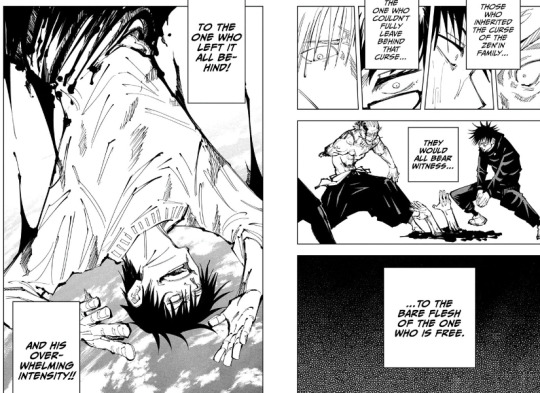
Toji shows us a version of Megumi who lived up to his full potential as a sorcerer, became someone strong enough to threaten Satoru Gojo, and who put himself above everyone else and... Toji's fucking miserable.
Toji is the bad ending of Megumi. He's strong but that's all he is. The narration refers to him as a puppet of carnage, only living to fight the strongest around. In fact, Toji dies BECAUSE he wanted to feel validated as the strongest. The decision to say and fight against Gojo when Gojo unlocks reverse cursed technique leads to his death. Being the strongest and his desire to be validated as someone strong is nothing more than a curse for Toji and what allows him to escape the cycle is not strength, but rather seeing that his son has succesfully escaped the abuse of the Zen'in clan.
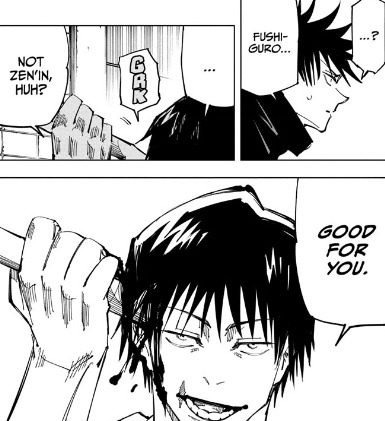
So having Megumi live up to his full potential as a sorcerer, or living selfishly the way that Gojo or Sukuna wanted him to wouldn't really be breaking the cycle, because it'd be Megumi acting the way his abusers wanted him to act. If anything it' be Gojo's long term grooming of Megumi finally succeeding.
I understand that Megumi fighting back on Sukuna from within with one use of ten shadows to create a puddle underneath Sukuna's feet isn't the most dramatic way to signal his journey of self-realization, but sometimes the flashy, dramatic, and satisfying thing isn't always the right thing.
if the central relationship of the series is Megumi and Yuji, and the central question of that relationship was "is it possible to save someone who doesn't want to be saved-" then resolving both Megumi and Yuji's character arcs requires answering that question. That's the most important part. How are we going to break the cycle and have Megumi and Yuji save each other in a way that Geto and Gojo weren't be able to.
Yes, I understand wanting Megumi to be his own person and stand on his own two feet, but before he's a person Megumi is a fictional character. Megumi and Yuji are characters intentionally designed to be each other's other half. The same way that Geto is designed to be the other half of Gojo. They both represent a yin / yang pair. They both represent the shadow and the light, the sun and the moon.
People also talk about wanting Gojo to learn to be his own person outside of Geto, but that's also missing the point. Gojo isn't a person to begin with he's a character designed to be the other half of Geto. All of those parallels that exist between them, both of them getting their bodies stolen from them, both of them becoming monsters (geto slaughtering the village, Gojo slaughtering the elders), both of them dying on the same day. Those are intentional, because they're fictional characters meant to represent the concept of yin and yang and balance. Gojo cannot exist without Geto, Geto's body causes Gojo to get boxed, Gojo dies within a year of killing Geto, because they're meant to represent the taoist concept of BALANCE in a manga that's about BALANCE. Gojo cannot achieve balance with the character that symbolizes his yin. Whereas, Megumi's way of achieving balance is to find a way to make things work with his other half Yuji in a way that Geto and Gojo failed to.
As someone who used to be the biggest Megumi Corruption Arc truther, I've come around in my thinking and I can at least understand why Gege didn't go that direction. Megumi learning to be selfish like Gojo would be changing too much of Megumi's inner nature, because as much as Megumi pretends to be selfish as an excuse he still is someone who wants to help people.
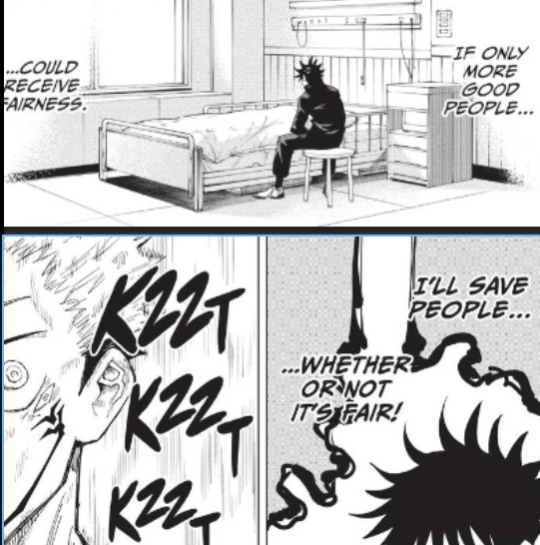
There's nothing wrong with Megumi wanting to help people, or wanting to be a team player. It was Megumi deciding to hinge his entire self worth on just his ability to help one person. It's why he couldn't go on when Tsumiki died, not just because he was grieving his sister, but because he decided to make protecting his sister his entire reason to live and genuinely saw no other reason to keep on living.
A lot of people say that Megumi is just deciding to make Yuji into an emotional crutch the same way he once did with Tsumiki, however, I don't think these lines of dialogue really indicate that.
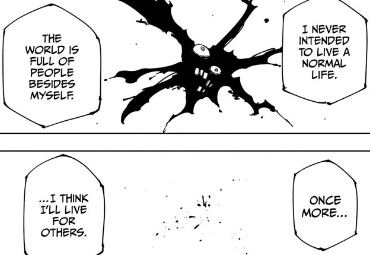
"The world is full of people besides myself. Once more I think I'll live for others."
To begin with, Megumi says that the world is filled with lots of people. Megumi didn't want to go on because he didn't think he'd ever love someone as much as he loved his sister. That there was nothing in the world worth living for if his sister was gone.
However, now Megumi is acknowledging that there are more people in the world than just Tsumiki. That he might come to love them the same way that he loved her. That he shouldn't give up on life just because he lost one person, no matter how important that person was.
Megumi's words run contrary to the idea that he's just going to use Yuji as his next living emotional crutch, because he says the world is full of people. There's more people than just him, there's more people than just Yuji, as long as Megumi makes the choice to continue living then he can go out into the world and meet them.
Jujutsu Kaisen is a very individualist manga, and I understand we also exist in an individualist society so we want to see Megumi stand on his own two feet and live for himself, but I don't think Megumi deciding he'll live for others is a bad thing. This is just a few chapters after Yuji said that what makes life meaningful is the memories you leave behind with other people. Which is the exact same sentiment.
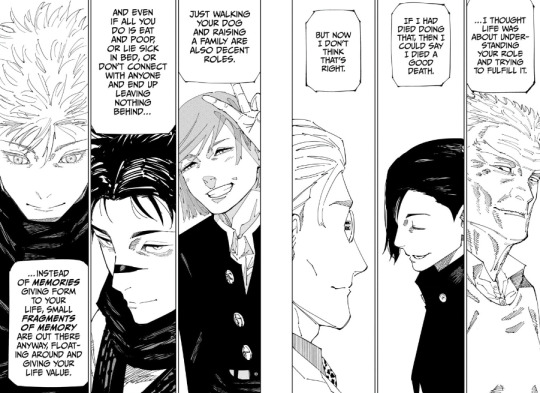
Yuji is able to break free from the cog mindset when he realizes that all the people he connected to in his life gave his life meaning, even if they died tragically, even if he only knew them for a short time. Choso's final words are "Thank you for being my little brother" and that connection was incredibly important even though they only knew each other for about a month. Yuji's life became meaningful because he went out into the world and made all these important connections.
Now Megumi is doing the same thing. He's resolved that even though his sister is dead the world is full of people he can connect with. That he can come to love other people the same way that he did. That his life is still worth living because he can find new people to love. Is Megumi deciding he can try to live for the other people in his life and his connection to those people even after the loss of his sister made him feel like his life is worthless and he'll never love anybody that way again, really that different from Yuji deciding that the people he made connections too gave his life value?
Jujutsu Kaisen lifts from other manga, this is pretty common knowledge. Killua and Shinji Ikari are probably the two biggest inspirations for Megumi and both are two very passive characters who are entirely reactive. They don't decide, they don't act, they react to the decisions of people around him.
Killua's ultimate moment of character development isn't beating his abusive big brother, or his abusive parents in a physical fight after getting a power up. Killua's greatest moment of character development is accepting Nanika as a part of Alluka. Something he was too afraid to do because it would mean that his family would continue to try to exploit Alluka for her wish granting abilities.

Killua finishes his arc with the resolution to protect both Alluka and Nanika from the rest of his family. Considering that Killua has been centering his entire self worth around his usefulness to Gon by this point you could call it Killua is just replacing Alluka with Gon as a crutch if you were cynical. Or you could just say that Killua, like Megumi is someone who lives for their loved ones and finds value in the bonds he makes with other people.
Shinji Ikari spends the entire 26 episode run of Neon Genesis Evangelion not making a single decision, and his final moment of character development isn't really that much character development. He simply makes the decision to reject instrumentality and try again. To go back to the real world and try to be a person in the world again, because as long as you're alive there's still a chance to be happy.

Megumi like Killua, never really changes. It's in Megumi and Killua's nature to be a protector / a nurturer. They want to take care of the loved ones in their lives. Megumi and Shinji both have an arc where it takes the entire anime / manga to take the very first step. Their arc is there to depict how hard it can be to take that first step on the journey to change when you're as traumatized as someone like Shinji or Megumi.
Megumi's arc especially is about him making his very first decision in the whole manga. As I said the central question of Megumi and Yuji's relationship is can you save someone who doesn't want to be saved and Yuji eventually finds you that you can't.

Yuji's greatest moment of character development and empathy for Fushiguro is realizing he can't force savlation on Fushiguro if Megumi doesn't want it. He can't force Megumi to live. He can't just tell Megumi to be stronger.
In doing so Yuji does something that no one has ever done to Megumi in his life, and offered him a choice. Gojo expected Megumi to be as strong as him and saw him as a mini-gojo never once taking his opinion into the matter. As I said above Gojo sees being strong as the soliution to all of life's problems. His adivce to Megumi was don't be weak, otherwise you'll be left behind.
Yuji allows Megumi to be weak. He says that Megumi doesn't have to be strong and suck it all up. The metaphor of Yuji and his grandfather works well to show how Yuji truly understood Megumi in a way Gojo never did. Gojo expected Megumi to be as strong as him. Gojo encouraged Megumi to grow up into another Gojo. Gojo failed to understand Megumi in many ways because he wasn't Gojo, and enjoy Jujutsu and being a sorcerer the way that Gojo did.

Yuji relates the story of his grandfather rejecting chemo treatment. At the time he didn't understand why his father would refuse the treatment just because it was painful, because Yuji being young would have been very easily able to handle the pain. However, after Yuji went through trauma and started dealing with suicidal ideation in the aftermath of Shibuya he understood why some people wouldn't want to keep fighting.
Yuji knows what it's like to be weak and want to give up so he doesn't want to force Megumi to be strong. Gojo projected himself onto Megumi and expected Megumi to always be strong and to love Jujutsu like he did, and didn't understand the ways Megumi was different than him. Yuji on the other hand accepted Megumi for who he was with those words, even though Megumi was weak and didn't want to continue living Yuji didn't crticize him he accepted that Megumi was different from him. He accepted the fact he didn't really understand Megumi's pain. He validated Megumi's pain and didn't try to dismiss it.
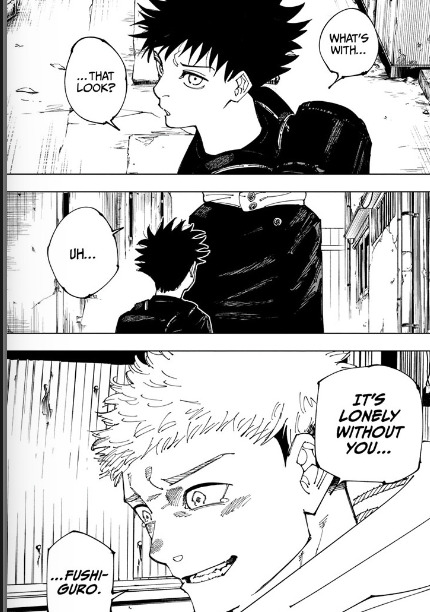
This parallel to Gojo and Megumi's first meeting is so important, because Gojo showed up in that child's life only to exploit him. While Yuji gave Megumi a choice. Even if it meant that Yuji would be lonely and heartbroken, he still gave Megumi a choice on whether or not he wanted to live.
In the end Yuji gave Megumi a choice, and Megumi made that choice to keep living. Just like Shinji, Megumi's entire character arc was just leading him up to taking the first step on his journey. Just like Shinji, Megumi's entire arc is defined by his choices being taken away from him but the very first choice he makes is his most important one: the choice to live.
So yes, a Megumi corruption arc would have been really cool but I think the answer of "You can't save someone who doesn't want to be saved, but you can still love them" is a beautiful one.
#jjk meta#megumi fushiguro#yuji itadori#itafushi#satoru gojo#suguru geto#satosugu#ryomen sukuna#jujutsu kaisen spoilers#jjk 271#jujutsu kaisen 271#jujutsu kaisen#jujutsu kaisen meta
446 notes
·
View notes
Text
Blue Exorcist Character Guidebook 2: Mephisto
Info on Mephisto from the new guidebook! Each character has a profile followed by relevant questions from fans, and then there's an interview section later where Kazue Katoh gives commentary on each major character and each manga arc. I have more guidebook than time, so I'm skipping the parts that are just like...summarizing who he is and stuff. So this will mostly be fan questions and Katoh's commentary
Biographical info
Gender: Male Age: (°w°) Rank/Titles: Director of True Cross Academy and head of the exorcism cram school, Honorary Knight for the Knights of the True Cross, King of Time Anniversary [T/N Katoh gives demons these in lieu of a birthday]: August 28 Blood type: ( ʹ - ʼ ) Height: 195 cm (184 cm without the "horn") Weight: 74 kg Skills and interests: movies, manga, anime, games, music, toys, miscellaneous subcultures
Fan Q&A
How do members of the Knights of the True Cross usually find out that Mephisto is a demon king?
I think some people might find out from books, the internet, etc even before they become exorcists. They do publish demon field guides that you can find at regular libraries, and Mephisto seems like the type to mention it in online interviews. Rin was the only one who didn't know.
How long has he had his current body?
About 200 years.
Which media from Assiah has had the greatest impact on him?
I imagine he would have been shocked the first time he saw a cinematograph.
Mephisto really likes all sorts of entertainment; has he ever tried making something himself?
Demons in general (not just Mephisto) tend to be bad at creative pursuits, though there are exceptions. Mephisto has a certain respect for human creativity.
Why is he so fond of Beelzebub?
Beelzebub just kind of struck a chord with him. Meanwhile, Beelzebub also likes being spoiled by Mephisto.
Which other demon kings get along with Mephisto the best?
In order: 1. Beelzebub 2. Amaimon 3. Egyn 4. Astaroth 5. Iblis 6. Lucifer [T/N it took me like an entire minute to work out that Azazel is the one missing from this list. Presumably because he's a rock]
Has Mephisto ever altered the past?
He sure does say a lot of things that imply that! [T/N: Katoh. Katoh. Katoh.]
How rich is Mephisto exactly?
He's actually one of the world's top businessmen and investors. His total assets are probably over one trillion yen [T/N: Jesus f*ck][T/N: that's about US$6.7 billion]
Author interview
Mephisto is a character who can solve just about anything; does that make him hard to write? Honestly, he's super easy to deploy. Mephisto has the plot in the palm of his hand and can fix stuff behind the scenes; he's the one pulling the strings. For adaptations and spinoffs, I just say "if you need to fill in a plot hole, make it Mephisto's fault" (laughs). But I do think it's dangerous to overdo it.
He even took on a sort of narrator role in chapter 44, didn't he? Around Volume 10, I was trying to treat each chapter like its own self-contained oneshot. Mephisto didn't even feel out of place as an omniscient narrator for one chapter, and for me that really drove home what a convenient character he is. Though I'm always wondering when and how to show Mephisto's own serious motives and inner thoughts, since he does fall into that eternal comic narrator role.
He can suddenly turn terrifying just when you were thinking he was comical. Hidden depths. Fundamentally he's on the humans' side, and he's often in charge of comic relief, but I do want to show his demonic side too. Same with the familiars; I want to portray the demons as something humans are afraid of.
#if you saw me post this to my reblog blog then no you didn't#blue exorcist#ao no exorcist#mephisto pheles#translation#blue exorcist guidebook 2#did you know forbes keeps a list of every billionaire's net worth that updates every 5 min like a dystopian mmorpg leaderboard#Katoh gave total assets instead of net worth but still. General ballpark of world's 500th richest guy#*Old Man Yells At Cloud Voice* in my day that would've been top 10 (<-does not actually know if that's true)
168 notes
·
View notes
Text
bottom line why henry/hans' romance works so well and isn't Out Of Nowhere is bc they were friends first. plain and simple.
tom mckay said (10:20) it best himself, but to summarize, their friendship is an anchor for henry, "the missing piece of the puzzle for henry is hans", and that henry and hans' relationship in the first game was "light and fluffy" but in the second it goes much deeper in so many different ways. these words actually hold weight bc the writers took the time to develop and Show this relationship grow.
it's so refreshing to see quality writing and care after back to back soulless and rushed games. the writing is mature overall, no modern lingo, no clear understanding from either of them of what they want or feel but without the focus being on internalized homophobia or a coming out arc. call it what you want, they're just good friends or it's something deeper, it works either way because the love they have for each other doesn't even need to be spoken to be understood.
and I'm honestly impressed w warhorse for doing this, bc yeah they could've just. not. they could've played ignorant and went "uhm we're going for historical accuracy☝️" and kept catering towards their horde of losers. don't get me wrong, it's great that games nowadays include optional gay romance, but sometimes it feels like devs include it just for diversity points (or bc players want it, not bc they actually care to explore these relationships which is why most of them feel so empty, e.g. making everyone playersexual). I personally find it much more impactful when the relationship is canon bc part of me is a little sick of our love being seen as lesser and that we have to be hush hush about it. so yeah I'm glad the medieval simulator that attracted dudes who think they're roman gladiators has been about two bisexuals being so grossly in love with each other this whole time. it's a big dick move and the funniest thing warhorse could've done
164 notes
·
View notes
Text
My favorite thing about Ma Meilleure Ennemie is that, while it's played at the climax of Ekko's romance with AU Powder, the song itself is actually a conversation between Ekko and Jinx.
Or rather, it's the conversation of the things Ekko and Jinx want to say to each other, but never do (maybe they had something like it when Jinx was staying at the Firelight base, but I sort of doubt it).
So if we take Pomme's lyrics as Jinx speaking, there's one line in particular that I find really interesting.
Je t'avais dit : "Ne regarde pas en arrière" (I told you: "Don't look back")
Le passé qui te suit te fait la guerre (Your past will follow you and wage war on you)
This is Pomme/Jinx's last solo line and it's soooo heartbreaking to me. Because this is basically Jinx summarizing her arc in season 2. No matter how she tried to escape it, or what she did to try to put it behind her, the consequences of her past actions "followed her and waged war" on her.
And this acknowledgement and understanding plus the "Don't look back" line really feels like it's what Jinx must be thinking as she's leaving Piltover for unknown horizons.
This is basically her way of saying goodbye to Ekko.
307 notes
·
View notes
Text
On TAZ-
Wow that sounds like I’m about to summarize some sort of discourse but I promise I’m not. I guess I’ll say that I really like this show and I will keep listening even if my worst fears come to pass, so keep that in mind!
For reference, I started listening near the end of Amnesty.
I’ve noticed, with the past few arcs- really since Ethersea- the narratives have just… not been fulfilling their promises, so to speak. They’ve been placing a lot of guns that don’t go off. What I mean by that is, the characters are great. Excellent, really. Lady Godwin? HELL YES. Emerich Dreadway? Fuck yeah! And so on! And the settings and premises have been epic- the goofiness and also horrifying nature of Engrave, the mad and thrilling world of Steeplechase- these things are COOL AS FUCK.
and then the actual narratives keep flopping?
And honestly, I notice it most in the endings, because you can really tell when an ending doesn’t land. You feel the sense of disappointment. But with vs. Dracula, for example, I could kinda see leading up to it that the ending couldn’t really BE anything special, because they lowkey didn’t set themselves up for it.
They spent the campaign fucking around in Engrave, finding clues and solving problems and not really experiencing any particularly meaningful character arcs or growth or, idk, forming relationships? So there wasn’t much to pay off, I’m not gonna lie!
Of course it doesn’t feel quite as dissatisfying when you’re in the thick of it, because they’re funny and the stuff is cool and- oh hey! Lady Godwin’s been turned into a werehorse against her will?? that’s got some real potential for a LOT of allegories and exploration of some fun character development! And then it’s kinda played as a joke. And then they do that again and again.
And they actually said that that was a move they made intentionally, in the TTAZZ. I’m not quoting them perfectly here, this is from memory, but I do remember them mentioning that they wanted lighthearted comedy without the burden of real life story stuff. And I get that, honestly, but… it’s not the choice I would’ve made. I do think you can keep a lighthearted tone while also, idk, forming relationships and wholesomely engaging with some amount of emotion. And sometimes going way too deep is funny as a tone shift!
But I digress. One thing that’s also popped out to me is the almost complete lack of any kind of romantic storyline or even references. This becomes obvious if you’re in a fandom because everyone is always dying to ship SOMEONE, and you can tell when people are really getting desperate. I don’t blame them for not wanting to roleplay romance with their family, and I do think stories lacking romance are COOL and SHOULD BE ENCOURAGED!
However if you can’t find ANYBODY to ship together… that may mean you just don’t have character bonds. The growing popularity of the PC polycule is interesting to me; I wonder if it’s partially because
a) none of the pcs have significant relationships outside of their party and
b) even within the party, there doesn’t seem to be much chemistry between any given pair of characters…? I hope I’m making my point well here- the PCs all seem equally close and have more or less the same relationship to all of their compatriots with little distinction, meaning, essentially, no shipping fodder that doesn’t involve just all of ‘em.
Either way, it makes me wonder if I can blame the “Graduation has too many NPCs!” critique. They really stopped giving the parties tag-along main NPCs after graduation, with the exception of maybe.. Urchin? Kodira? Shlabethany? Poppy? and even they get relatively little “screen” time. Steeplechase has great NPCs, I love them to death, but none of the PCs seem to ever have one on one conversations with NPCs or each other that do not explicitly focus on the plot. And I think that’s part of why the characters feel so underdeveloped despite having spent a lot of time with them- because in this character-driven genre, we get very little insight into their feelings or motivations or even their rudimentary backstories.
I started watching Fantasy High recently and it made me realize a couple things about TAZ.
1) Recently, TAZ has sooo few core NPCs, and it’s weird that the characters aren’t doing more one-on-one purely character based scenes. And that makes it really tough to develop them.
2) TAZ is- and I should have realized this before- one of many good dnd podcasts. They’re probably looking for a niche they can master.
And it sounds like they’re trying to get back to that old “Here there be Gerblins!” energy. They’ve referenced it so many times in recent TTAZZes- they wanted to be job-focused, allowing story stuff to happen organically, so they tried a more open world vibe with Ethersea. They wanted to be less afraid to kill stuff, so they tried playing criminals (and were still afraid to kill stuff). They wanted to be silly and light on character, as they tackled with taz vs dracula. Now they’re trying to bring in the silly cartoon vibe with Abnimals. I think they’re trying to make that family-friendly, funny and goofy show their niche. Something other actual plays can’t be better at them at.
And honestly it kinda makes me sad, that they keep trying to go back to Balance while ignoring everything they learned during it. Because I loved Dust. Because I loved Amnesty. Because I loved Ethersea. I loved these past arcs! But they keep doing their brilliant characters dirty for some reason!!! And i don’t know why!!!!
You know that meme about people who ask questions in movies and then the person responds “Have you ever been to a movie before? You watch them and the information is revealed.” There have been so many times in TAZ recently where information has Not been revealed and if they keep doing it the audience will stop bothering to suspend their disbelief, because the trust just isn’t there.
What is Montrose’s deal? What on earth was Carmine Denton’s whole thing? Tell me more about Zoox’s feelings, about Devo’s past, about Amber’s future. Show me how Lady Godwin feels about the body horror that is her life- like, seriously! WHY DID WE HAVE TO COMPLETELY DISMISS THE OPPORTUNITY TO DISCUSS GENERATIONAL TRAUMA IN MUTT’S LIFE FOR A JOKE??
Do you remember in Steeplechase where the boys were getting medical attention or something- i don’t remember, but they were all in one room and only talking about The Plot. And Poppy literally banged on the door (speaking for both Justin and me, tbh) and was like “does anyone want to share any feeeeelings??” and they were like NOPE! and they moved on!!
like. cmon. you can’t just put a character like montrose out there and then leave them severely underdeveloped to the point that what would be interesting in proper context, with audience insight, becomes confusing and chaotic.
I just wish they would take their stories as seriously as we do.
It feels to me like they don’t believe in themselves, and it makes me sad. Maybe they didn’t get the response they wanted from Ethersea and so they’ve been trying to pivot, hoping to recapture whatever it was that earned them a loyal audience.
Again, I love them. They’re so funny and I’ll keep listening until the day they stop making this show, and when it happens I’ll cry.
But i KNOW they have more in them. Remember the “we’ll grow gills” monologue from Justin in the Prologues? Remember Travis’s SOLID acting with Devo? Or his awesome choice to give Lyndon/Beef a clearly delineated work/irl identity? His excellent narration and prose? Remember when Montrose described being lonely?! Remember all those moments where Shit Got Real and you cared??? The nanofather said some dope shit! dracula and victor and sweater dracula had such a wild dynamic! Clint’s acting in Dust 2- I can’t remember the characters name right now- was ASTOUNDING, I genuinely didn’t know he had that in him and it blew me away!
I’m not referencing Balance on purpose, both because the fandom is way to hung up on it and because I want to prove that you don’t even have to look at Balance, or even Post-Balance arcs, to see this kind of good cool stuff!
GAAAAAAAGHHHH!!! I want them to have fun. But also. We’re starving out here.
#that’s all for now#i need to go to bed..#taz#the adventure zone#taz steeplechase#taz vs dracula#taz ethersea#cheshi squeaks
258 notes
·
View notes
Text
RW Headcanon: How Arti Gives Back

In the RW community on this site, I’ve heard quite a few Artimand thoughts about how Gourmand would help Artificer heal from her trauma and grief. And while that’s all good, something that’s continuously puzzled me when shipping Artimand romantically is, “but how would Artificer help Gourmand?”
Let me tell you, one of my all-time favorite qualities in a ship is the characters helping each other improve themselves, especially in ways no other character pairing can. And while it’s easy to see Gourmand helping Artificer improve, given the vast amount of grief and lust for vengeance she has to overcome, and since Gourmand probably has a natural inclination to help others in need, what would she give to him in return? And to add to that, why would Gourmand fall in love with her and choose her as a mate, as opposed to just casually looking out for her and straight pitying her at worst, especially when she’d most-likely appear very un-qualified for romance initially?
Well, I’ve developed some thoughts and headcanons for that, and I’ll put them below the cut! Please let me know if anything could be improved, or if you can add to it! I’d love more reasons to think of these two sweethearts!
Option 1: Combat
Arti would help Gourmand improve his combat skills. The way I see it, Gourmand is a very strong warrior, but doesn’t often engage in combat simply because he doesn’t see a need for it outside of defense. Even then, due to his kind nature, he typically only fights back enough to deter predators, not kill them. However, with Arti being a carnivore, and having LOTS of experience with more complex combat situations than just defense (mostly from scav encounters), I like to think that Arti would give Gourm more combat tips and they may even end up bonding on occasional hunting trips together. And it would circle back to Arti because Gourm, with his cooking skills, would make the resulting meals from their hunts taste SO much better than what Arti is used to, allowing her to slow down and really enjoy food in a way she hasn’t been able to with her warrior lifestyle!
Option 2: Motherhood
This one’s pretty self-explanatory. Given Arti was a mother once, and Gourmand’s story ends with him getting 2 pups, I could easily see him wanting Arti to stay around to act as a mother for them. Not only would that give her the chance to embrace motherhood again, but it would take some pressure from Gourmand because he has a partner (and an experienced one at that) to help him with parenting! I mean, don’t get me wrong, Gourmand is undoubtedly great with pups, but even so it’s good to have some help! Even more so since (depending on what general age you headcanon the pups as) he’d likely have to leave his pups alone while getting food; it’d be nice to have someone with her own experience caring for pups who can look after them during those times and, to add onto the first option, even help teach them how to hunt and survive on their own!
And heck, I personally actually like to imagine that, a little later, after she gets comfortable enough and fully overcomes her grief, Artificer would actually have a second litter with Gourmand (naratively-speaking, this would signify the completion of her character arc)! Of course it’d be a big deal for Arti, but just imagine how much fun Gourm would have exploring the new experience of getting to raise biological pups this time! And I can just see him being so, so thankful that Arti somehow managed to give him even more family to love!
Option 3: Passion
So this one’s the most personal-headcanon-based, and built off my personal depiction of Gourmand as a character. In my headcanon, Gourmand starts out as a rather reluctant leader of his colony. I have this whole idea of what specific event led to him becoming the leader, but to summarize, it seemed like a very sudden chance event at the time, yet from it he was more-or-less unanimously chosen to lead by the other Outer Expanse slugcats due to him having shown great creativity, survival skills, and protectiveness. Gourmand himself, however, doesn’t really feel he’s fit to be a leader; he’s used to an easygoing life just peacefully surviving and doing his own thing, not managing and defending an entire colony! He’s so used to seeing the simple parts of the world that he often underestimates himself, so something as “grand” as leadership often appears too great for him.
That’s where Arti comes in. I like to imagine that Artificer is extremely passionate, but that for a long time after her pups’ deaths, that passion was manifested almost exclusively as immense rage, grief, and desire for revenge against their killers. But imagine if, once she gets comfortable with Gourmand’s colony, she begins to show that passion in positive emotions! Not only would she, after seeing what he’s capable of in hunts, help him see that he IS the perfect leader for his colony, but just IMAGINE: Arti hyping Gourm up as the biggest, strongest warrior in the Expanse, just before the two prepare to take down a king vulture; or Arti patching him up after a really tough battle and assuring him he’ll be even better next time; or Arti teasing Gourm and them chasing each other around as they spar together in the OE fields; or Arti getting all dramatic as she recites tales of her epic scavenger battles to his eager pups; or Arti showering Gourm with kisses after he makes a REALLY good meal with her favorite meats! There are SO many possibilities for hypeman Arti, and I figure that, once Gourm sees her fiery spirit used in a positive way, especially to help him and his family, he can’t help but fall for her! And this idea is part of why I like the Spicybun ship name so much - while Gourmand helps Arti mellow out, Arti literally spices up his life! They just compliment each other so perfectly!!
-.-.-.-.-.-.-.-.-
MAN do I love these two so much! This is about all I have right now on this subject, but again, I’d LOVE to hear any other ideas for how Artificer would help Gourmand, or additions to these ideas! I just adore the “opposites attract” ship trope (although I personally prefer to call it “inverses attract”), and I think Artimand is easily one of the best examples of that in Rain World!
Thank you to anyone who made it to the end of this wall of text! And let me know if I should share any more Rain World headcanons, because I’ve definitely got more!
Oh, and if you've found this, @melissa-titanium, hope you like it again! Let me know if you ever want me to stop @-ing you with these Artimand headcanons, by the way!
#art#artwork#sketch#doodle#digital#digital art#fanart#rain world#rw headcanons#shipping#rw shipping#slugcat#rw slugcat#artificer#rw artificer#gourmand#rw gourmand#artimand#rw spicybun#rw barbecue#quetzalli draws#quetzalli pairs#quetzalli headcanons#honestly though girls giving their boys some sweet loving is a fancy of mine for all my favorite ships#i just think arti would be especially passionate about it#in like a “YEEEAAAHHH!! That's my husband!!!” kinda way
948 notes
·
View notes
Text
Just saw this 30 minutes Hugo Vlad character analysis video and I so need to share it because of how good it summarized his entire arc from 1.6 to 1.7
Since this is a lycahugo household, I need to talk about the segment regarding those two, because OP mentions something I haven't seen much here: They point out how Lycaon and Hugo both made the difficult decision of being friends again.
Even if they choose to mend their relationship, is not out of complete forgiveness because, let's be honest, the tinge of hurt and pain always stays with us; we can see it in Hugo trust events and the flower shop event by the way Hugo taunts and hides things from Lycaon, and how at times they argue, but their interactions always ends up in this shared silence that carries so much weight by the things that keep being left unsaid.
If anything, the things unsaid is what pushed them both individually to think their relationship is worth the reconciliation.
However, their reconciliation feels like it takes two steps forwards and three steps back at times, simply because the bond they're now trying to remake is sullied by Lycaon's abandonment and Hugo's betrayal (I call it a betrayal bc for years that's what Lycaon believed happened!)
And yet, Hugo doesn't blame Lycaon for believing the worst of him when at the time he didn't even know if he was evil by nature; Hugo made the choice to let Lycaon walk his own path, free of the burden of his anger, and Lycaon apologized for not trusting Hugo, and has never blamed him for his injuries. If anything, Lycaon admires the person Hugo is turning out to be after confronting his shadow.
Yet the sensation remains. Of course, it's not easy, but seeing that they're both down to maybe not rekindle the past, but be a part of each other's future, is a testament to how much Lycaon and Hugo care about each other.
Of how much they feel the love and friendship the other can give is worth being together again and letting go of past grievances.
#daily lycahugo post mwskjsjsja#lycahugo#crownwolf#von lycaon#hugo vlad#ZenZero#zenless zone zero#zzzero
94 notes
·
View notes
Text
Season 2 thoughts
I have been reading a lot of #arcanecritical posts and really enjoying them. There are so many great points to be made, especially about the political struggle that gets set up in S1, making it seem like the show is trying to go with an anti-establishment narrative, which it does not follow up on in S2. Irl I'd describe myself as very far left on the political spectrum - having said that, I still prefer S2. Why? I think S1 has great writing. The thing is, at least to me, it felt too clean, almost technical in execution and like it was biting off more than it could actually chew. What do I mean by this? I'd never expect a Netflix show, that was made to promote an online game, to produce truly radical art. In all honesty, it would be naive to think it could. Arcane explored aspects of political struggle, within the constraints it is given, but if you are aware of what those constraints are, you can see them EVERYWHERE. So what makes Arcane great to me, is not its perspective on politics, but its character writing - the way it shows how each character has their own agenda, born from a personal struggle, operating within the system they were born into and how that creates conflict. That's why discussions about "is Character XY in the wrong for XYZ" are interesting, but do not prove any point about the quality of the show itself. So what do I like about S2? I like that it does not really attempt to solve any of those conflicts, but focuses on showing the consequences of them - and yes, those consequences are often not satisfying. And the fact that they are not satisfying, actually makes it better, than what a lot of other shows do, which is create a magical nonmaterialistic solution. Don't get me wrong - it's really sad, for example, that Viktor gets his autonomy taken away, zero recognition for how it was not his fault for wanting to fix his disease, but the systems for him getting sick in the first place and then ends up dying as a villian. I also think it is pretty realistically what would happen in our world, aswell as the world established in the show. I believe what gets misunderstood, because politics are part of the narrative, is that Arcane never set out to tell a story about people rising above oppression or ways to overcome class struggle. I feel like that it is, a (at times well done) backdrop to the interlocking character arcs they wanted to explore. You can pretty much summarize it in that one, very popular image on tumblr. You know the one with the astronauts, where it says "Arcane was about love?" "Always was". S2 really delivers on that. Jinx and Ekko. Vi and Caitlyn. Viktor and Jayce. Mel and Ambessa. Singed and Orianna. And even Silco and Vander, where it shows how both of them chose their wildly different paths to protect their daughters. I also think that they took what the show most excels at - its art style - to the next level in S2. So to summarize: I think critiques of how and why Arcane failed in terms of politics, are valid. But to say Season 2 was bad for not delivering what it could never deliver (and I would argue never promised it would - thinking that they wanted to and then somehow fumbled it in S2 is just wishful projection) is not fair to everything it does exceptionally well. But feel free to roast and disagree with me :)
58 notes
·
View notes
Text
Mulder's Brain Disease: an Open-Minded, Analytical Dissection (In-Depth)
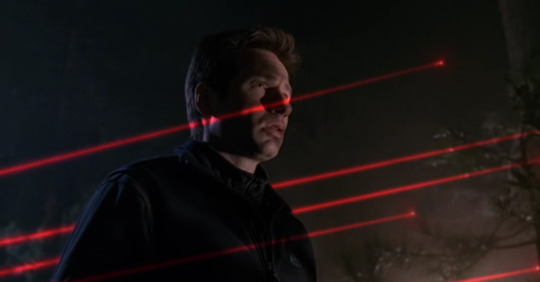
Mulder's brain disease, love it or hate it, has to be one of the most unnecessary plot threads of The X-Files. Not only is it wedged into Season 8 haphazardly, but it accidentally stains a new wash of retroactive interpretation into Season 7-- a not altogether successful maneuver, all told.
Most of the canonical evidence provided clashes with itself, many of the details volunteered undermine its collaborative vision, and each piece of action or exposition is either forwarded with the assumption of legitimacy-- and therefore unchallenged-- or immediately discredited in the next scene or scenes.
There are two clear paths and one alternative to explore: Mulder didn't have brain disease (per Season 7's original intent); Mulder did have brain disease but didn't tell Scully (what Agent Doggett is led to believe); and Mulder had brain disease but didn't know it.
Let's begin.
STATEMENT(S) OF (ALLEGED) FACT
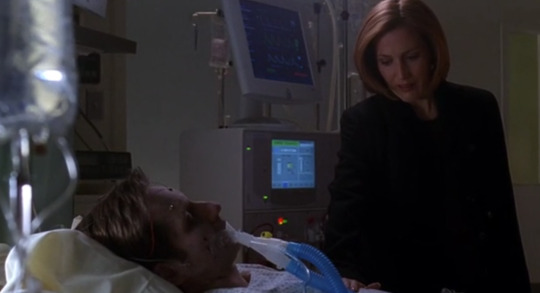
The X-Files is well-known for its... questionable timelines. That becomes exponentially more complicated with Season 8's tightly wound schedule and Scully's pregnancy (which Spotnitz and Carter stuck to rather well-- barring a few logistical hiccups-- post here.)
The brain disease arc inflexibly hinges on a retroactive retelling of Season 7's schedule. One chronological bookend is Amor Fati (stated to have taken place "in the fall"); and the other is the month of May: Mulder takes "four consecutive" road trips to North Carolina, allegedly pops over to Squamash Pennsylvania (twice), and supposedly buys himself a new headrest (read: gravestone)-- all within the span of four weeks. Additionally, we have allegations of a year-long brain disease-- despite all evidence to the contrary-- which places Mulder in a position of secret keeper or liar by omission (which CC has vehemently denied, post here.)
BRAIN DISEASE
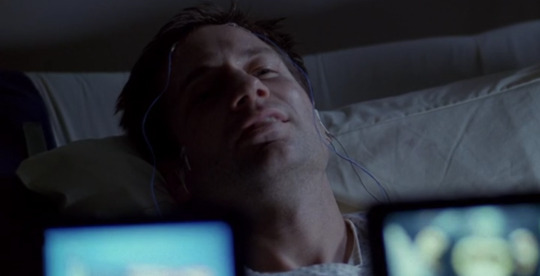
(**Note**: This section's information will be summarized under the "FACTS AND FICTION, THOUGHTS AND THEORIES" subsection.)
Requiem builds on top of the "encephalitic trauma" Mulder experienced in Biogenesis-Amor Fati-- one that, we're told, made him "more alive than he's ever been." So alive, in fact, that his body couldn't support itself and shut down; and so alive, in fact, that CSM cut out a part of Mulder's lobe and Frankensteined it into his own.
The show's mythology set up the alien-human virus as early as Season 3, and built upon that foundation with the characters' subsequent adventures in Fight the Future, The Beginning, and Biogenesis. As a virus, it grafts onto human DNA and changes it-- or in this case, reactivates from junk DNA. As Dr. Anne Simon, a consultant for The X-Files, explains:
Jan. 2001:
"...I work on viruses. Viruses can’t turn into anything. If a virus turns into something, it’s not a virus. I was really horrified. So I read the rest of the script, and I came up with a different science that would only change a few conversations, but it would change the idea of what the virus was. And I had my fingers crossed that he’d go for it. If Chris wanted that virus to turn into something, he would’ve done it whether I wanted it to or not. But he loved the new idea: The virus integrates itself into the DNA of the person. That’s what a lot of viruses do, activate a resonant program in the cell. There’s a program in all our cells, in our DNA that starts with that single egg and turns us into a person. And that’s encoded in our genes, in our genetic makeup.
"The problem is that there’s a huge amount of DNA we don’t have a clue about. There’s a whole lot of DNA that we call junk DNA. We don’t have a clue what this junk DNA is doing. My idea was the virus activates a resonant program in the junk DNA, and that the junk DNA is actually there to turn a cell into the horrible creature, which means that we are the aliens."
Point taken. Multiple (questionable) vaccine inoculations and infections aside, humans in The X-Files world have latent alien DNA. The ancient artifact Mulder handled in Biogenesis activated his; and, unable to bear up under that extremis, his body was reduced to catatonia and shut down. Though there are quite a few problems with that specific chain of events (most of which I discuss in an alien virus post here), the logic could, theoretically, hold up.
ENCEPHALITIC TRAUMA AND REWRITES
In Amor Fati, Mulder was so far gone that he'd disconnected from reality (although his "inner" world was still influenced by outer events.) How, then, was Mulder brought back from the land of fantasy? Metaphorically, it was through Scully's belief and love and courage; practically, it was because of the (successful) medical procedure he underwent during his captivity (post here):
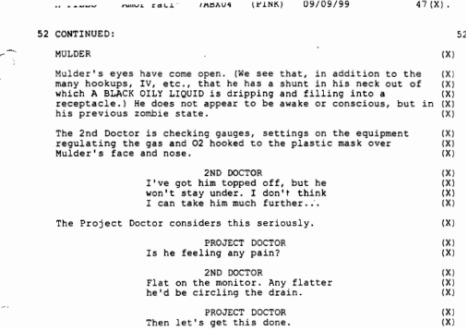

RULING OUT: TREPANATION AND BRAIN EDEMA
Two possible causes for Mulder's later complications need to be explored before we move on.
Firstly, as with a great deal of other components on the show, trepanation is not as simple as the writers propose:
World History.org, here:
"Trephination (also known as trepanning or burr holing) is a surgical intervention where a hole is drilled, incised or scraped into the skull using simple surgical tools. In drilling into the skull and removing a piece of the bone, the dura mater is exposed without damage to the underlying blood-vessels, meninges and brain.
According to Academic Press's 'Osteoarcheology': "A neurosurgeon can perform the procedure safely, although it comes with severe repercussions such as direct or indirect perioperative complications, which include increased damage to the brain, infection, blood loss, hemorrhage, and potentially death due to the trauma as the skull's protective covering is compromised."
Here, its perils are hand-waved away with "advanced alien science"; but to potentially complicate Amor Fati's explanation, the purpose of Mulder's surgery was to slice out an activated portion of his brain and transfer it to CSM's:
Penn Medicine, here:
"A temporal lobectomy, or temporal lobe resection, is a neurosurgical procedure that removes the front part of the temporal lobe of the brain to treat drug-resistant epilepsy. Each person has two temporal lobes, located beneath the skull on the side of the head in the temple region. The temporal lobes play important roles in memory, emotional responses, language, and sensory memory and processing of sounds, visions, and smells."
While it's possible that Mulder's and CSM's declines could have been kick-started by this procedure, that's not the route canon follows. Spender's deterioration is tied to "cerebral inflammation", which in turn is tied to Mulder's pre-surgery encephalitic distress-- in short, pre-trepanation trauma.
Secondly, the script also details a medical procedure that is most often used to relieve and treat brain edema (brain swelling)--
NHS, here:
"Ventriculostomy: In this procedure, a surgeon cuts a small hole in the skull and inserts a plastic drain tube. Cerebrospinal fluid is drained from inside the brain, helping to relieve the pressure.
Surgery: Surgery may have one or more of these goals:
A. Removing part of the skull to relieve intracranial pressure; this procedure is called decompressive craniectomy.
B. Removing or repairing the source of the swelling, such as repairing a damaged artery or vein or removing a growth."
Brain edema-- depending on the extent and duration of the trauma-- usually inflicts various degrees of harm. And while that could be promising when discussing Mulder's brain disease, Scully would have seen evidence of edema-ridden damage on his CT and MRI scans during his convalescence. Further, brain edema is not a form of brain disease, rather an offshoot effect of that condition-- therefore, not the cause of his (alleged) impending death.
AUTHORIAL INTENT AND REWRITES
Inverse to Mulder's reawakening and restored health is CSM's 30 touch-and-go hours and grim, post-operation prognosis:


His doctor's hints about a second surgical intervention are particularly intriguing. When CSM reappears in Closure, Scully notes his odd pallor-- "You're sick"-- which he doesn't deny-- "I had an operation." We are to assume he is referencing the brain surgery in Amor Fati-- he is-- but I would like to posit Spender could be referencing a possible second procedure (an off-screen attempt to mitigate his ailing health.) By En Ami, CSM's fate is sealed, and he openly admits his mortality in order to ignite Scully's trust (post here): "Cerebral inflammation-- a consequence of brain surgery I had in the fall. The doctors give me just a few months." His arc comes to a close in Requiem (unless you push canon into Season 9 and beyond) where we see the rapid toll of his deterioration.
Recovery from "advanced alien science", then, is aided by regular, everyday human physiology: age, health, medical history, and comorbid influences. Spender's age, smoking status, and former cancer diagnosis all combine against him-- his hubris for power led him willingly to death.
By contrast, Mulder's experience wasn't mentioned again until Requiem when he and the Bellefleur residents-- who'd previously suffered encephalitic trauma-- were called to the ship and abducted. There was no idea, hint, or reference sown about his deteriorating health: not a sign, not a symptom. Yet, mere months later, the tale is retold in Within: we learn, allegedly, that not only did Mulder have brain disease (and not only did Scully not know) but he'd also suffered through it for a year.
Frank Spotnitz admitted, after the close of Season 8, that the brain disease (and the IVF arc) was a last-minute creation he and Chris Carter decided on after their plans for a second movie set post-Requiem fell through:
April 2001:
"In the absence of pre-existing context for season 8’s dramatic surprises, the writers relied instead on flashbacks tailored to fit this year’s narrative. “Had I known there would be a season 8, I would have preferred to salt in all of the clues about these flashback episodes last season,” says Spotnitz of how he dealt retroactively with fitting in Mulder’s illness and Scully’s [IVF]. “But there really is no way to unravel these mysteries in my mind, and make use of David in the time that he was available to us, without having some flashback episodes.”"
Setting aside the complete lack of evidence that would “prove” Mulder was suffering from a degenerative brain disease, silently, for a year (without telling Scully), we’re left with a few bare-bone facts:
Season 7 was not written with the brain disease in mind.
Mulder's "encephalitic trauma" in Requiem was shared by the other Bellefleur residents, who were not (that we know) dying.
CSM declared that he was dying from "cerebral inflammation."
CSM's downturn post-Amor Fati was recorded at key moments through Season 7, with scrutable markers of decline and clear indicators of psychological shifts and changes influenced by his impending death.
In Within, we’re led to believe Mulder was suffering from year-long degenerative damage due to the surgery he and CSM underwent in the fall of 1999. Not only do his actions (or non-actions) in canon contradict this thesis, but Within-The Gift's timeline contradicts it, as well.
Deadalive-Three Words Mulder never confirmed he was diagnosed with-- or knew he was suffering from-- brain disease.
What, then, is "cerebral inflammation"; and how can we work in the brain disease as more than a creative (though flawed) hypothetical?
THE FIRST ROUND OF INFECTION

Encephalitis (“cerebral inflammation”) is pretty straight forward: you either have it and notice, or you have it and don’t.
There are two main types of "cerebral inflammation"--
NIH, here:
Inflammation in the brain and spinal cord can be caused by infections such as viruses. Encephalitis can also be autoimmune when antibodies can attack brain cells.....
NIH, here:
"Because people may have subtle symptoms of encephalitis, many cases may go undiagnosed. Several thousand cases are reported each year, but many more may occur since the symptoms may be mild at onset in some people."
Encephalitis hits fast and hard, disappearing within two weeks (Better Health, here) of its inception. Mild instances can pass through the body undetected; but severe or life-threatening cases are unequivocally transparent:
NIH, here,
"Once the acute illness, which normally lasts for 1 to 2 weeks, is under control, comprehensive rehabilitation should include cognitive rehabilitation and physical, speech, and occupational therapy if brain function is severely affected."
Mount Sinai.org, here,
"Those with a severe case of encephalitis may develop:
High fever
Severe headache
Stiff neck and back
Photophobia (sensitivity to bright light)
Sonophobia (sensitivity to sound)
Vomiting
Drowsiness and confusion
Seizures
Behavioral changes
Muscle weakness
Partial paralysis
Loss of consciousness
"Because encephalitis can on rare occasions be dangerous, it needs to be diagnosed and treated promptly....
"Many people exposed to encephalitis-causing viruses have no symptoms. Others may experience a mild transient illness, but do not develop full-blown encephalitis. People with mild encephalitis generally recover spontaneously over a period of several weeks.
"Severe cases of encephalitis can, however, have devastating effects, including:
Swelling of the brain caused by excess fluid (cerebral edema)
Bleeding within the brain (intracerebral hemorrhage)
Nerve damage (neuropathy)
"Encephalitis is a relatively rare disease. People at highest risk for encephalitis, and its complications include the very young, the very old, and people with weakened immune systems."
NIH, here:
"Because the disease can occur suddenly and progress rapidly, anyone who is suspected of having encephalitis should immediately contact a doctor or go to the hospital.
"...In more serious cases, the disease can cause hearing and/or speech loss, blindness, permanent brain and nerve damage, behavioral changes, cognitive disabilities, lack of muscle control, seizures, memory loss, or death. People with serious cases of encephalitis may need long-term therapy, medication, and supportive care."
Lastly, the risks for serious complications arise with the usual physiological predispositions and environmental factors--
Mayo Clinic, here:
"Anyone can develop encephalitis. Factors that may increase the risk include:
Age. Some types of encephalitis are more common or more serious in certain age groups. In general, young children and older adults are at greater risk of most types of viral encephalitis. Similarly, some forms of autoimmune encephalitis are more common in children and young adults, whereas others are more common in older adults.
Weakened immune system. People who have HIV/AIDS, take immune-suppressing medicines or have another condition causing a weakened immune system are at increased risk of encephalitis.
Geographical regions. Mosquito- or tick-borne viruses are common in particular geographical regions.
Season of the year. Mosquito- and tick-borne diseases tend to be more common in summer in many areas of the United States.
Autoimmune disease. People who already have an autoimmune condition may be more prone to develop autoimmune encephalitis.
Smoking. Smoking increases the chances of developing lung cancer, which in turn increases the risk of developing paraneoplastic syndromes including encephalitis."
In Biogenesis, we are told the alien virus in Mulder's DNA is activated when he touches an ancient artifact; but it's debatable if that incident lines up with viral (infection via an outside invader) or autoimmune (mistaken antibodies attacking its host) encephalitis. Regardless, that question is secondary to the main hypothetical: if encephalitis ("cerebral inflammation") has a short shelf life, what was killing CSM (and Mulder?)
REINFECTION: AUTOIMMUNE ENCEPHALITIS
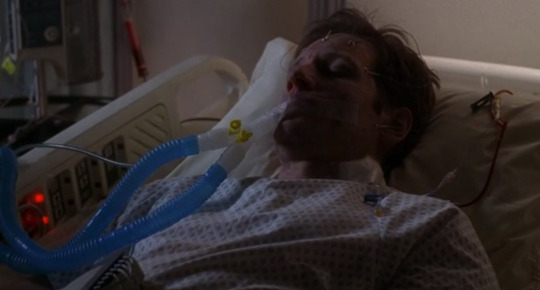
The problem begins with CSM's (and Mulder's purported) year-long deterioration. "Cerebral inflammation", as explained above, does not drag its feet when swooping in for the kill. And more broadly, how is Mulder able to be reinfected with a disease which old Spender sliced and diced from his head? Better Health.gov's description (here) fits what the writers were going for, I believe: "There is evidence to suggest that some cases of viral encephalitis are caused by dormant viral infection... becoming active again." This plays well with Mulder's initial infection (Biogenesis), as well as CSM's lengthy "cerebral inflammation" and Mulder's (alleged) inflammatory reemergence.
However: recurrence is a symptom of autoimmune encephalitis, not viral encephalitis--
NIH, here:
"Although rare, there have been cases of post-infectious autoimmune encephalitis (where it is triggered by an initial response to an infectious agent)."
Autoimmune encephalitis: a review of diagnosis and treatment, here:
"Viral infections are known triggers for AIE. It is believed that virus-mediated brain tissue damage may lead to antigen exposure that triggers the development of anti-neuronal antibodies."
Another checkbox that can be ticked off: AIE might take longer to diagnose because of the difficulty pinpointing symptoms--
NIH, here:
"Diagnosing autoimmune encephalitis can be difficult as the average onset of symptoms to diagnosis often takes a few weeks to 3 months. ...To diagnose autoimmune encephalitis, we need multiple tools to aid in the diagnosis, although clinical judgment is the key to making decisions. They will include a constellation of neuropsychiatric symptoms, lab studies, neuroimaging, and electroencephalogram."
Slowly-degenerative AIE cases (though infrequent) do exist--
Autoimmune encephalitis: a review of diagnosis and treatment, here:
"By way of generalisation, autoantibody-mediated disorders often present rapidly, over a few days to weeks. However, we have observed more chronic courses, of between 1 and 5 years, particularly in leucine-rich glioma-inactivated protein 1 (LGI1)-antibody, contact-associated protein 2 (CASPR2)-antibody and immunoglobulin-like cell-adhesion molecule 5 (IgLON5)-antibody syndromes. These findings mean that time to disease nadir is often outside of the 3-month duration which appears in diagnostic guidelines."
Nevertheless, atypical cases are often put through rigorous testing to rule out other degenerative autoimmune diseases due to the severity of their symptoms: mood changes, mental confusion, muscle tremors, seizures (focal rather than generalized), pain, psychiatric symptoms, and (more often than not) tumors.
"Autoimmune encephalitis: a review of diagnosis and treatment", here:
"Seizures occur in most autoimmune encephalitis syndromes and are a common factor that triggers neurological attention. The types and frequencies of seizure vary between autoantibody-mediated diseases and may help pinpoint the individual autoantibody. …These patients, typically men in their fifth to eighth decades, have very frequent focal events with multiple semiologies and only rare generalised seizures....
"In addition to treatment of the underlying immunological process, it is often necessary to consider management of seizures, movement disorders, behaviour, pain, sleep and autonomic disturbance, and mood disorders. We do not discuss this substantial topic comprehensively here but rather we focus on special considerations relevant to the two most common forms of autoimmune encephalitis: NMDAR-antibody and LGI1-antibody encephalitis."
It is possible, however, that the extent of the damage Mulder received during his surgery might have been overlooked-- fertile ground for the next trauma-induced biological onslaught:
NIH, here:
"Because lesions can sometimes be clinically asymptomatic, a systematic neuroimaging work-up should be performed.... Cerebral computed tomography scans [CT scans] performed at admission show abnormalities only in 30% of patients, essentially supratentorial readily visible diffuse or large focal hypodensities of the cerebral white matter. MRI of the brain should therefore be systematically performed when post-infectious encephalitis is suspected."
But the basic premise (and same problem) of 'traditional' encephalitis remains. AIE, though possibly reoccurring, does more harm in the short term than the long run: its most powerful weapon is either immediate death or a damaging domino effect--
NHS UK, here:
"Encephalitis can damage the brain and cause long-term problems including:
memory loss (amnesia)
personality and behavioural changes
speech and language problems (aphasia)
swallowing problems (dysphagia)
repeated seizures or fits – known as epilepsy
emotional and psychological problems, such as anxiety, clinical depression and mood swings
problems with attention, concentrating, planning and problem solving
problems with balance, co-ordination and movement
persistent tiredness"
It's not a leap, then, to suppose that--
CSM's health immediately crumbled apart because of his age, health, and smoker status.
Whereas Mulder's health-- if he was affected-- was bolstered up by youth and other factors. However: that does not rule out a potential sleeper agent lurking in his brain, waiting for the next traumatic incident to reactivate, AIE-style. (We'll get to that.)
FACT AND FICTION, THOUGHTS AND THEORIES

The facts, as we know them:
Encephalitis, no matter its form, is not a slow-burn, long-term killer. Yet, the fallout from its destruction can create a domino effect that could, potentially, be lethal.
Regardless of the original diagnosis, CSM and (allegedly) Mulder suffered from autoimmune encephalitis after Amor Fati.
While mild cases can be undetectable, severe or life-threatening encephalitis can't be masked and must be treated promptly.
CSM is doubly or triply immunocompromised-- per his age, past cancer, and on-going smoking habit-- and was promptly affected.
Mulder and the Bellefleur residents were abducted and transformed due to past "encephalitic trauma", not current, prevalent brain disease.
Most importantly: if Mulder and CSM had been dying over a year's time, there would have been conspicuous physical evidence-- evidence which Scully would have detected (as she did in Closure.)
Irrespective of these facts, let's play around with a few hypotheticals.
If Mulder and CSM had been dying contemporaneously, then they would have to be deteriorating from the ripple effects of at least one of three factors:
Extensive brain damage-- which would have become immediately apparent once they woke.
Accumulative comorbidities set in motion via brain damage-- which Spender did, and Mulder did not, have.
Reactivated effects caused by another traumatic incident-- which Mulder could have had (and did) in Season 7.
That last point is a particularly intriguing theory. Mulder would have been suffering profusely had his disease run concurrently with CSM's-- but what if it didn't? What if Mulder's brain disease was a recent diagnosis-- one he'd received before his abduction? If so:
His reticence from Scully would be short-lived and easily explained by Mulder still processing the news.
His sudden rash of trips to his mother's and sister's graves could be influenced by anxiety over an impending medical report or in reaction to an inflexible diagnosis.
His headstone purchase could be explained as a rash, last-minute gesture of acceptance (or could have been faked by his nemeses, which we shall get to.)
Yet, and this cannot be stressed enough: even if Mulder had a recurrence of encephalitis, it alone would not be enough to kill him, just like it alone would not be enough to kill CSM.
To get to the bottom of any and all possibilities, we need to map out a simple, logical, cut-and-dried timeline.
So, let's do it.
CANONICAL (AND RETROACTIVE) TIMELINE
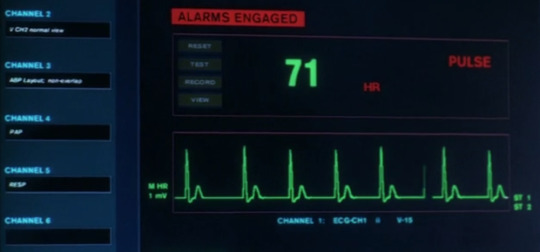
(**Note**: If you don't care to read the discovery process, skip to PUTTING IT ALL TOGETHER.)
To chart a course through the brain disease's cluttered "shoulda, woulda, coulda"s, two options present themselves: episodic air dates, or in-canon date markers.
Here we run into the first problem: neither touchstone works unmitigatedly: either in-canon dates reorder key episodes (perhaps the props department worked off the script rather than day-of filming?) or air dates don't graph cleanly onto defined in-canon perimeters and events. What we'll have to do: nail down the definitives, and work back (loosely) from there.
xfilestimeline.net provides an exquisite guide to (most of) The X-Files's chronological order, which I will be referencing below (direct quotes in italics.)
AMOR FATI
Amor Fati takes place "in the fall" according to Within. The air date (November 14) and in-canon estimate (October 7-14) both roughly group into that space. Mulder is wearing his "victory cap" to come find Scully; but it's hard to know for certain that the hallway scene takes place shortly after the last week of September (which, according to xfilestimeline.net, was the first Yankees victory of the season) or if he simply wore it to cover his bandages and bantered around the obvious.
Either/or is viewer's choice.
SIGNS AND WONDERS
Signs and Wonders's air date (January 23) outruns a "medical report" (January 17-19) by just a few days.
EN AMI
En Ami takes place (comparative to any month afterward) "last spring." Since there is no internal date provided, it either falls on March 19 (its air date) or sometime after February 20 (X-Cops's in-canon date) and before April 14 - May 1/May 8-12 (Brand X - Chimera's in-canon dates.)
Again, viewer's choice.
SEIN UND ZEIT
Sein und Zeit airs on February 6th; but its date is "confirmed" by a TV broadcast of State of the Union Address (January 27 - February 1.)
BRAND X
Brand X's air date (April 16) coincides with its in-canon, two-week recovery estimate (April 14 - May 1.)
CHIMERA
Chimera debuts a full month prior (April 2) to in-canon configurings (May 8-12: Date confirmed at outset ((2 weeks after 4/23)).)
Chimera marks the first overlap between Season 7 and Season 8: Mulder (allegedly) visited Squamash, Pennsylvania on May 6 -7, a day before he and Scully were assigned to a stakeout (May 8.) It's not stated how long Mulder and Scully were on duty before he was again reassigned; but it stretches believability (what else is new?)
ALL THINGS
all things has no fixed internal date, though it's air date (April 9) takes place a full month before the estimated in-canon dates (May 13-15.)
FIGHT CLUB
Fight Club's airing was May 7; but its own internal date (June 17-19) so incontrovertibly contradicts Requiem's abduction timeline that it can be confidently swapped out for May 17-19.
This episode is pivotal to quite a few brain disease theories.
JE SOUHAITE
Je Souhaite air date (May 14) is hastily surpassed by its estimated internal date (May 22-24.)
This episode is vital to understanding the brain disease arc-- more accurately, to understanding Mulder's mind frame when given three wishes.
REQUIEM
Requiem is key to the entire framing of the brain disease arc:
Either Mulder is abducted on May the 21st (Requiem's air date), which shreds through Agent Doggett's May timeline (which will be discussed below);
Or Mulder is abducted on May 31st (the day before Within), which tears fewer rips in Agent Doggett's theory.
Pulling from my "Laying Waste to The Gift (with Its Own Canon)" meta (post here):
A. ...Doggett refers to Mulder's trips as "Four consecutive weekends in May"-- distanced language that (one can infer) means the month is over. (If he and Scully were still in May, Doggett would have more naturally stated "each weekend this month" or "the past four weekends.")
B. Spotnitz has since confirmed Within takes place the day after Scully's reveal in the hospital ("Season eight begins the morning after season seven." Interview here.)
C. Therefore, it's safest to assume Within takes place in June (either June 1st or June 2nd), pushing Mulder's abduction date to May 31st.
WITHIN
Within begins the complete disregard for air dates-- and rightfully so, given the strict guidelines of Scully's pregnancy (post here.)
See Requiem above: takes place June 1st.
PER MANUM
Per Manum takes place mid-September (Scully's baby is fourteen weeks old. Given that she announced her pregnancy to Skinner at the very end of May, it seems likely that she conceived in mid-May, which would give a mid September date for this episode.)
THE GIFT
The Gift is broken into three trips: (allegedly) Mulder, May 6 A.M. - 7 A.M.; (allegedly) Mulder, May 24; and Doggett, late September. (No internal dates provided. It is said to be roughly a "year" since Mulder visited Squamash, but given the events of Episode 8x14: This is Not Happening, it's more like under half a year. Doggett confirms that Mulder was abducted in May. He went to Squamash, PA on May 6-7, and returned there on the 24th. Doggett also reveals that Mulder falsified case reports, which explains how the dates might be off at the end of Season 7.)
This episode is, quite frankly, a catastrophe. I broke down the timeline and its inconsistencies in a previous post, here-- suffice it to say, it discredits its own claims in its own episode. But, we will be returning to this... gem later on.
PUTTING IT ALL TOGETHER
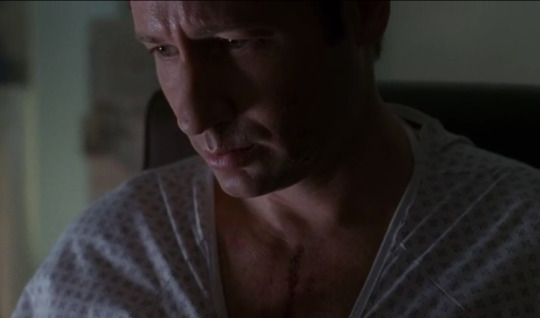
Now that we have a framework for both seasons, we can begin to slot the pieces side by side.
"In the fall", Amor Fati: Mulder and CSM both undergo brain surgery. Mulder fully recovers (or does he?) while CSM deteriorates slowly over the course of a year.
April 14 - May 1, Brand X: Mulder is hospitalized some length of time during his two weeks of recovery. Neither Scully nor the medical staff notice any medical abnormalities (i.e. odd or troubling physical responses, readouts, or charts) despite heavily monitoring his health.
May 6-7, The Gift: Mulder burns up one of his consecutive weekends by (allegedly) taking a trip to Squamash, Pennsylvania on May 6-7.
May 7: Mulder takes his first 370 mile trip (10 hours total) from D.C. to North Carolina and back. He will (allegedly) make three more consecutive weekend drives until his abduction in Requiem.
May 8, Chimera: Mulder has a case ready for he and Scully to investigate (one that likely required the weekend to research-- more on that later.)
May 13-15, all things: Mulder burns up another consecutive weekend on a trip to England.
May 17-19, Fight Club: Mulder takes some heavy hits.
May 22-24, Je Souhaite: Mulder doesn't consider asking the genie-- not once-- to heal his brain disease.
May 31, Requiem: Mulder is abducted due to his "encephalitic trauma", courtesy of Biogenesis's ancient artifact.
June 1, Within: The Alien Bounty Hunter parades around Mulder's life, stealing his (and Scully's) computer.
June 2, Within: Doggett obtains rental car receipts, VISA card purchases, and year-long medical records, thereby coming to the conclusion that Mulder took four consecutive weekend drives (nearly 400 miles, over 10 hours) from D.C. to North Carolina. Doggett and his team do not find Mulder's gun taped under the apartment sink.
Late September, The Gift: Doggett finds a case from last May he and his team had missed. He also finds a bloody gun taped under Mulder's sink that he and his team had missed. He also finds an incriminating report that has Mulder and Scully's name on it that he and his team had missed. He does not check the dates against "Mulder's May Pilgrimages", nor does he corroborate the signatures and evidence with Scully.
Chronological order locked and loaded.
DEBUNKING AGENT DOGGETT'S (ESTIMATED) ITINERARY
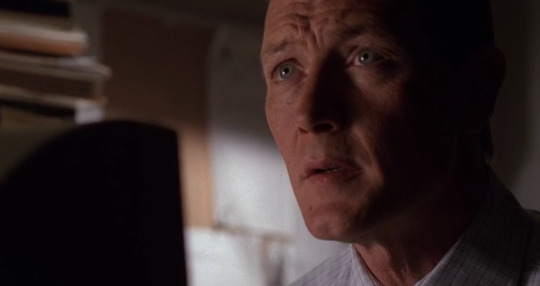
Now, let's break down the evidence Doggett "unearths."
SUPPORTING EVIDENCE
In Within, Agent Doggett rests Mulder's brain disease on three rational (and one discredited) facts:
Mulder's surgery "in the fall" (Amor Fati)-- one Mulder did not, apparently, recover from. Doggett and his team discover "evidence" indicating a year-long decline which the files predecessor had kept secret from his medical doctor-partner.
Mulder's "four consecutive weekends" drives to North Carolina ("Same mileage each trip: 370 miles, 375 miles"), which means he either kept them hidden from Scully or she lied to Doggett when questioned.
Mulder's sudden, erratic purchases in May: flowers and a personally-inscribed headstone on the same VISA card.
Mulder's and Scully's missing computers and files (later proven to be the Alien Bounty Hunter's machinations.)
In The Gift, Agent Doggett discovers further "proof" to support his supposition:
Mulder (allegedly) took a trip to Squamash, Pennsylvania to investigate a case on May 6 (Saturday.)
Mulder (allegedly) returned to be healed by the Squamash creature on May 7.
Mulder (allegedly) turned down the opportunity to be healed in order to mercy kill the Creature.
Mulder (allegedly) hid his bloody "murder weapon" (an ankle gun) under his kitchen sink.
Mulder (allegedly) had Scully sign off on his closed report, with or without fully informing her.
Mulder (allegedly) placed his and Scully's careers in danger because of this falsified report... conveniently (post here.)
DESTRUCTIVE CONTRADICTIONS

Problem #1: Doggett Needs Four Weekends
As we've explored, ad nauseam: the car rental receipts Doggett finds in Mulder's desk plainly communicate four weekend trips in May.
Mulder burns up the first weekend of May on the Squamash trips: he arrives in Pennsylvania on the morning of May the 6th (Saturday) and doesn't leave until the early hours of May the 7th (Sunday.) He is then (allegedly) supposed to drive a 10 hour round trip-- without sleep, while (allegedly) suffering the painful effects of deteriorating "brain disease"-- and be back by Sunday night to prep for an X-Files stakeout on Monday. Both trips cannot coincide with each other, which means one-- or both-- have to go.
Mulder burns up a second weekend on his trip to England: he begins preparing to leave on a Saturday (estimated May 13) and arrives back a day or two later (estimated May 15.)
Mulder might burn up a third weekend recovering from Fight Club: the extent of his injuries would probably inhibit his ability to drive safely-- not to mention the possibility of a compounding, painful "brain disease."
Discounting The Gift (which is rife with inconsistencies and contradictions), two of the four necessary weekends were spent elsewhere.
In fact, the only weekend Doggett can rely on (per his own timeline) is the one following Je Souhaite-- three days before Mulder's abduction. (That weekend will be instrumental later.)
Problem #2: Doggett's "Evidence" Doesn't Match His Timeline
Mulder's VISA card made a lot of purchases over the course of May, some of them reasonable (flowers for his loved ones' graves) and some of them questionable (a headstone and rental cars.)
The VISA card's legitimacy was authenticated by the rental receipts on Mulder's desk-- but those rental dates don't match with Mulder's recorded movements (either by air date or canonical rewrite.) Discounting the Gift, at least two out of four weekends were spent in D.C. or England, not on the road back-and-forth from North Carolina.
Doggett doesn't question this.
That same VISA card was used to explain Mulder's tombstone purchase.
Doggett doesn't question this.
"Mulder" (allegedly) took two trips to Squamash, one the week before his disappearance-- the locals never described what he looked like, only testified that he questioned them and tried to kill the Creature later.
Doggett doesn't question this.
"Mulder" was spotted swiping FBI evidence in order to locate Gibson Praise, and was able to access "his" apartment as well as the office.
Doggett doesn't question this (even after seeing a doppelganger in Without.)
Mulder's VISA card, trips, "brain disease" diagnosis, bloody gun, and falsified report only pop up once he can't challenge their authenticity.
Doggett doesn't question this.
To give the man some credit, most of this can be excused away with the rationale that he doesn't believe in far-reaching conspiracies or boogie men trying to take down Mulder in the dark.
Indisputably, though, the onus is on the writers for tragically mucking up their timeline. Or helpfully, as it's easier to dismiss the entire brain disease arc as a hoax based on these claims.)
Problem #3: The Gift Collapses In On Itself
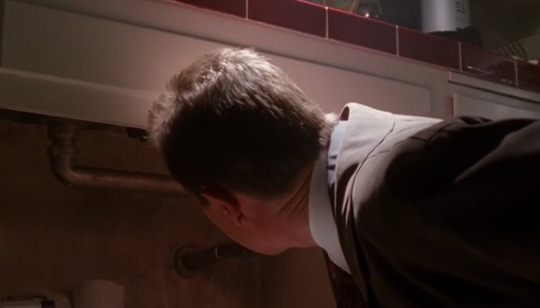
As previously mentioned, I've combed over The Gift's problems at length (again, post here); but let's go through it once more for totality's sake:
Mulder's trips to Squamash and his trips to his mother's and sister's graves can't coincide, not with late-stage "brain disease."
A solo case, a bloody gun, and falsified signatures-- each piece of "evidence" was missed by Doggett and his team in Within, despite the FBI's fervor to blame Mulder's disappearance on his erratic nature. Each piece of "evidence" conveniently materialized later when Mulder (or Scully) needed to be eliminated from the files.
Scully never confirms or denies the report's authenticity, nor her participation in signing off on it. Conveniently.
In protecting Scully, Skinner and Doggett likely incriminated themselves-- or passed over the clue that would unravel the conspiracy behind the trips, VISA purchases, and "Mulder"'s many appearances.
The last visit by "Mulder" to Squamash is unaccounted for. Say, perhaps, that he had traveled there on May 6 and shot the Creature on May 7-- that doesn't explain why he returned on the 24th. Unless, of course, it wasn't him.
Problem #4: Mulder Would Not Be Physically Capable
Not only would Mulder have to be hiding his (hard-to-miss) brain disease symptoms from Scully-- a medical doctor-- he would have to be squeezing in 10-hour weekend drives routinely after physically-demanding x-files all week.
Problem #5: Scully Was Unaware of Mulder's Weekend Trips
Within posits that Agent Scully was utterly in the dark about her partner's weekend activities-- which is, frankly, ludicrous given her and Mulder's history of constant communication and recent commingling.
This can be explained away with one or two considerations--
Scully was lying to Doggett about not knowing where Mulder was going (North Carolina, i.e. his mother's and sister's graves.)
Scully knew he would disappear every weekend but never bothered to ask where he was going (e.g. spending healthy time apart, caching up on other obligations, etc.)
--but it was not canonically intended. As if that ever stopped the writers or the fans.
Problem #6: Mulder Neither Confirms Nor Denies His Diagnosis
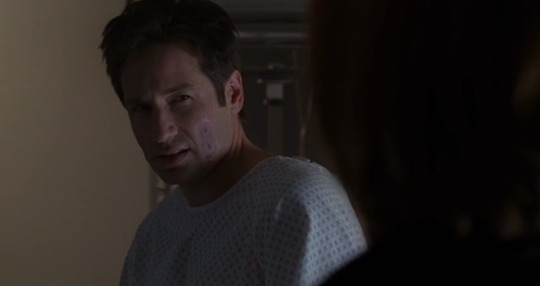
In Deadalive, Scully describes Mulder's condition as, "Blood, electrolyte imbalances, a loss of brain function. I strongly believe that Mulder is infected with an alien virus." (Another one, or the same one?) And when Mulder wakes, she tells him, "Whatever neurological disorder you were suffering from, it's no longer detectable. After a course of transfusions and antivirals it has rid your body of the virus that was invading it. The scars on your face, on your hands, on your feet, on your chest, they, they seem to be repairing themselves. Mulder, you are in perfect health."
Not then nor later does Scully say "your brain disease from last fall is healed"-- in fact, both seem to be discussing the super soldier virus he was infected with on the ship (a sleight of hand for the writers to dodge the ramifications of the brain disease arc.) In fact, is Mulder ever told he, supposedly, had brain disease?
Mulder was taken due to "encephalitic trauma", not brain disease (e.g. none of the other abductees were reported to have had ill health or further, recent complications.)
Mulder was infected with "an alien virus" bound and determined to turn him into a super soldier.
Mulder was returned "deadalive."
Mulder was healed (i.e. taken off of life support.)
So, he was likely told about his "encephalitic trauma" and his close brush with a super soldier zombie "alien" virus... but was Mulder ever specifically told about the (alleged) year-long degenerative brain disease? The one that doesn't kill slowly, and only claimed CSM's life because of the latter man's presumptive co-current comorbidities?
I think not. Whether Mulder did or did not have brain disease, the writers seemed to want to brush that arc briskly under the rug and never acknowledge it ever again-- which is exactly what they did.
BRAIN DISEASE BELIEVERS, THERE IS STILL HOPE
Despite the ravages this meta has wrecked on the brain disease arc, there is still a perfectly reasonable-- and dare I say, logical-- explanation that would seamlessly factor in Mulder's brain disease. One could still indulge in angst alongside Season 7's original intent and Season 8's post-hoc hypothetical with a guilt-free conscience.
May wonders never cease.
Except: the timeline must be drastically shortened.
THREE THEORETICAL TRUTHS
It's all come to this: three possibilities laid out before us.
Each idea works with the same conceit: Mulder was irrefutably (per the loopholes left in the writers' wake) setup by his enemies-- incongruous purchases, trips, and medical records collaboratively pulled together to blacken his name forever in the FBI-- with Scully's reputation soon to follow. The attempts ended with his burial-- which is doubly ironic, considering he rose from the dead three months later-- and the discovery of her pregnancy; but the "proof" of "their" endeavors stuck to the files like smoke.
MULDER WAS RECENTLY DIAGNOSED WITH "BRAIN DISEASE"
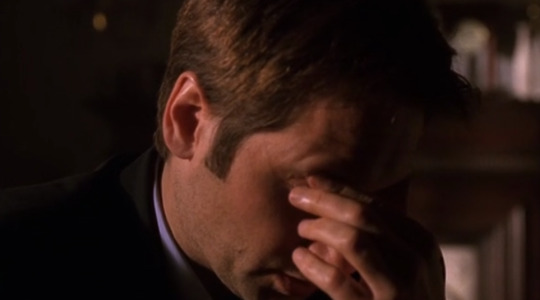
According to this theory, Mulder would have to suffer a recent relapse in order to fit in with the "cerebral inflammation" recurrence timescale.
Mulder would've had to suffer another trauma to kick off an autoimmune encephalitic malfunction.
Mulder's relapse couldn't have taken place post-Signs and Wonders or post-Brand X, since Scully would have observed the resulting tremors, mood swings, or early, small-scale seizures.
Fight Club fits the aforementioned criteria and gives Mulder a free weekend to drive to his mother's and sister's graves before Je Souhaite.
Mulder would have to have been given a "to be determined" precaution rather than a full-scale diagnosis because he did not wish to be healed in Je Souhaite.
Mulder would have had to be told bad news post-Je Souhaite and pre-Requiem.
"Cerebral inflammation", as has been hammered home, is not a lengthy death: sustained damage and other comorbid factors are responsible for potentially killing the patient after the disease has been treated. As we also know, "cerebral inflammation" can reoccur via erroneous immune signals or a second traumatic event (which would kick off said erroneous immune signals.)
Mulder was in the hospital three times after Amor Fati: once in Signs and Wonders, once in Brand X, and once in Fight Club. Scully was on hand for the first two concerns, and would have seen the results of his painstaking tests and recovery. But she wouldn't have been able to witness his records in Fight Club (since she was recovering herself.) It is wholly possible that the repeated stresses Mulder's body weathered caused a relapse, one which would have been so new and so recent that it wouldn't have manifested unmistakable symptoms-- yet-- before his abduction in Bellefleur. Given autoimmune encephalitis's grace period, that gives a few weeks to three months before Scully could, theoretically, have figured things out. If that be the case, it also slots onto one of two weekends Mulder had free to travel to North Carolina (Fight Club's case wrapped up on Friday the 19th, a day before Saturday the 20th.)
Most importantly, it saves Mulder's dignity. The greatest injustice of the brain disease arc is that it implies a level of ignorance he fostered on Scully's part-- a proclivity to lie by omission rather than openly share the truth between them. While Mulder does have a history of holding back the complete truth -- his exes and past partners, his retrieval of Scully's ova during the cancer arc, his concerns about Emily's paternity, and his mutual feelings towards her-- he was more vulnerably agape after the consummation of their relationship (displaying his fear quietly in Requiem's "I can't risk losing you" plea.) And let's face it: Mulder isn't equipped for the long con-- Scully unfailingly spots and deduces his schemes or aims.
Combine these factors with Mulder's forgetfulness in Je Souhaite-- not a thought was spared towards his mortality when offered three wishes-- and it makes sense why the medical evaluation and determination interval should be kept short.
By giving Mulder a smaller window of time to process, it falls in line with his and Scully's established character traits: his need to withdraw (e.g. Conduit, Pusher, The Red and the Black, One Son, Amor Fati, etc.) before making and sharing a decision with Scully-- and her innate ability to smell out protracted brooding like a bloodhound.
(And, as formerly mentioned, Mulder never buys a headstone, regardless-- no matter how many falsified VISA cards Doggett finds.)
MULDER DID NOT KNOW HE HAD "BRAIN DISEASE"
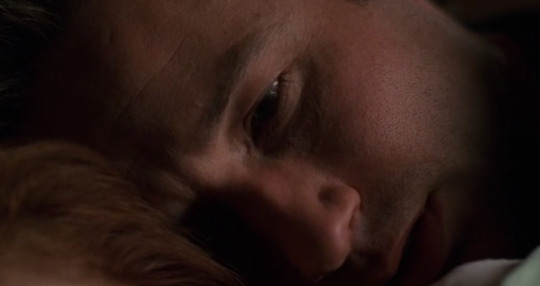
This second theory rests on the first's medical possibility, but weaves farther down a different path.
The same chronological order applies-- i.e. autoimmune encephalitis recurrence post-Fight Club.
However, Mulder is unaware of his ailing health: his doctors miss the early symptoms during their examinations; and since Scully is otherwise preoccupied (i.e. recovering), it's never notated.
Since AIEs have an additional buffer period of up to three months, and can be hard to catch without physical symptoms or a thorough MRI, it's plausible that Mulder never knew.
This would also fit with the Bellefleur abductees' "encephalitic trauma", strangely: their old injuries could have been recently triggered-- or forcefully triggered once on the UFO-- in the same manner that Mulder's injury was inflamed post-Fight Club.
This idea plays with the best of both worlds: Mulder's decay looming like a ticking time bomb over his and Scully's happiness; his and Scully's unbroken dedication to the truth and each other. A A VISA card and headstone, grave flowers and falsified reports were setup ahead of time-- orchestrated by the CSM's lingering shadow faction in allegiance with the aliens: Mulder eagerly offered as the price the overlords demanded from the humans.
It also works beautifully with Season 7's intended canon (Mulder whole and hale, with no brain disease in sight) and with his and Scully's miscommunication in Three Words (he assuming she's referring to the super soldier virus, she presuming he knows she knows about his brain disease.)
MULDER DID NOT HAVE "BRAIN DISEASE"

Lastly, Mulder was not dying from brain disease:
Chris Carter and Frank Spotnitz (and the other writers) did not conceptualize Mulder's brain disease when writing Season 7.
Mulder displayed zero symptoms in Season 7 in the weeks and months leading up to its finale.
Mulder did not wish to be healed when he came face-to-face with a genie in Je Souhaite.
The brain disease timeline Agent Doggett digs up in Season 8 is built on manipulable evidence and irrevocably, triumphantly falls apart on itself.
Mulder never confirms nor denies his alleged diagnosis.
According to this theory, Mulder recovered in "Amor Fati" and did not deteriorate further. Instead, he and Scully investigated their subsequent cases with lighter hearts as they finally consolidated their relationship, found his sister, and made peace with their individual and mutual choices in life. When Mulder was hospitalized for venomous snake bites, he did not display any neurological damage. During the events of Closure and En Ami, Scully quickly ascertained that CSM was suffering and dying-- visible, physical symptoms her partner did not have. When Mulder was hospitalized, again, for an infestation of beetles in his lungs, neither his MRIs nor close, personal observation indicated that he had late-stage brain deterioration and neurological or circulatory damage. When Mulder was hospitalized a third time (alongside Scully), whatever (off-screen) complications arose then were not enough to worry him when granted three wishes an episode later.
If this be the case, the evidence "uncovered" in Within and The Gift would have been outright fabricated. This hypothesis aligns in all respects with the flimsy and superbly dissonant pieces canon offers at different times-- information only forthcoming enough to cast doubt on Mulder's and Scully's good name before disappearing immediately afterwards. Evidence, moreover, that is never corroborated between either agent, or between themselves and Agent Doggett.
It would fit with Season 8's timeline, too: perhaps Mulder makes anomalous trips in May-- with or without Scully's knowledge-- but the dates of at least half of those alleged trips clash with weekends he spent on, or preparing for, other investigations. And perhaps Mulder did investigate Squamash (doubtful): his actions there could still be divorced from an ailing, desperate man.
THE TRUE BELIEVERS
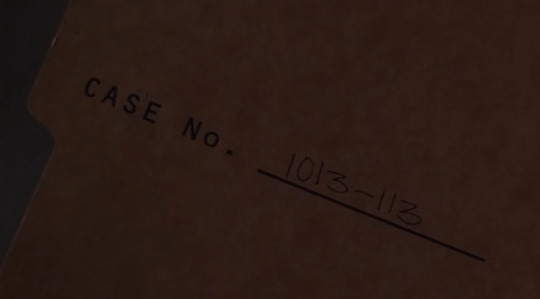
Of course, you can always headcanon Mulder did, indeed, have a year-long brain condition; but that would entail a total disregard of the facts. (Then again, when has that stopped canon before?)
FINAL VERDICT
As enlightening, entertaining, or engaging as this project has been, it will probably not shift or shape minds: whether someone believes in the brain disease or not depends on that person's emotional, observational, and intellectual tastes and pursuits.
My only hope is that this work creates or fosters a new perspective.
CONCLUSION
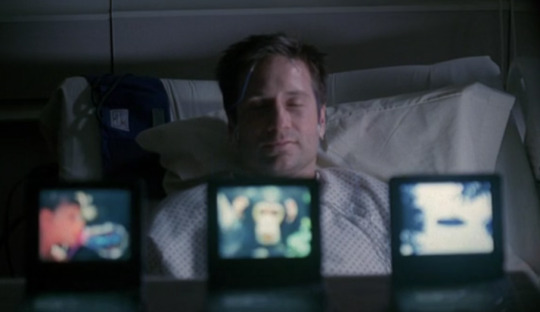
This has been my most researched and re-edited meta to date.
Thank you to @sagan-starstuff for affirming that, no, the brain disease made no sense and that, yes, I hadn't lost my mind. Hopefully the science presented tracks.
Thanks for reading~
Enjoy!
#txf#xf meta#x files#the x files#Mulder#Scully#brain disease#Doggett#In-Depth#S7#S8#mine#meta#Within#The Gift#Amor Fati#Closure#En Ami#xfiles#x-files#Mulder's Brain Disease: an Open-Minded Analytical Dissection#the biggest chonkiest researchiest meta I've done yet#thoughts
54 notes
·
View notes
Text
Sanji Week 2025 - Day 7: Sanji Day
Little Things to Like About Sanji
Doing something different for the final day of Sanji Week with a little translation project!
On the official Japanese One Piece youtube channel, they have this program where two hosts (and occasional guests) do fun OP-related content. In one of the episodes, they asked for fan submissions of their favorite "too detailed/minute/trivial" Sanji moments through a Twitter/X hashtag project, then they picked some and discussed them with Hirata Hiroaki-san (Sanji's VA).
The hashtag was [ #細かすぎるサンジの好きなところ晒す見た人も晒す ] which literally translates to [ # Exposing too detailed things to like about Sanji and the people who found them ]
The fan submissions are quite interesting (and some hilarious), but the video doesn't have English subtitles, so I thought I'd translate and summarize it. And what better day to share it than on Sanji's birthday!
Please feel free to reply or reblog with your own "too detailed" things you like about Sanji :)
[Beware of spoilers: some of these feature scenes up to Wano]
(This is not the order that it was shown in the original video. The first four are the ones personally chosen by Hirata-san, then followed by the hosts' choices)

"How Sanji doesn't even notice that he's popular with the beautiful ladies."
Sanji, of course, is always yearning for all the ladies, but seems to be oblivious when beautiful ladies such as Viola, Pudding, and Osome actually likes him.

"The discrimination when he handed over the stew"
In this Skypiea scene, Sanji handed the stew over politely to the other people, but then threw it over to Zoro. In Hirata-san's words: "It was not a matter of treating men and women differently [because he was handing it to Usopp—a man—in the first panel], it was a matter of treating 'Zoro' and 'not-Zoro' differently"

"Sanji said it was fine with him if Usopp died for Nami's sake, but Sanji himself also didn't mind dying for Usopp's sake"
When they were about to face Enel in the Skypiea Arc, Sanji told Usopp: "Listen, Usopp! If it's for Nami, I'm okay with you sacrificing your life", but in the end, he also kicked Usopp to safety and ended up risking his life for both of them

"These random interjections"
In this scene when Zoro was telling the crew about their meeting with Mashira during the underwater exploration/salvage operation pre-Jaya, Sanji kept interjecting Zoro with random unnecessary explanation.

"He took back [Usopp's] goggles that was taken by Bon Clay... even though it was broken"
This one was submitted by Yamaguchi Kappei-san (Usopp's VA)! In the Alabasta arc, Bon Clay stole Usopp's goggles in order to convincingly impersonate him. After Sanji won his fight with Bon Clay later in the arc, he took back the goggles and returned it to Usopp, even though they were already broken.

"Happy when touched by Nami"
After the Davy Back fight, Nami stopped Zoro and Sanji from arguing by smushing their faces away from each other, but look at the little heart on the next panel that showed Sanji was still glad for Nami's touch, even though the context here was her reprimanding him.

"Sanji never kicks women, but following Nami's advice, he runs away instead"
During Enies Lobby, Sanji refused to fight Khalifa because of his "no-kicking-women" policy and he ended up being beaten to a pulp. Following that fight, Nami said to Sanji: "If running away is also against your chivalry... then at least give up that part! There's no chivalry in dying a senseless death!" Sanji seemed to have taken her words into account and chose to run away instead of kicking women or being beaten when facing Black Maria and her cronies at Onigashima.

"Pure white only suits Nami-san and rice lol. As expected of a chef."
This is in reference to Sanji's line at Thriller Bark when he saw Nami in the wedding dress: "The only things that look good in pure white are Nami and rice". The fan who submitted this pointed out that associating "pure white" with "rice" was a very chef-like thought.

"In this scene, he didn't refer to Zoro as the usual 'swordsman', but as 'swordmaster'. I like how it feels like Sanji is acknowledging Zoro's strength. Of course, their fight right after and Usopp's reaction were also beautifully written"
Sanji usually refers to Zoro as "剣士 (kenshi)" or swordsman, but here he called him "剣豪 (kengō)" or swordsmaster. This was just before their Groggy Ring match at the Davy Back Fight, when Zoro was told to lose his swords because weapons were against the rules of the game. Sanji's exact line was: "Oi, is that okay? A swordsmaster without his swords is... kinda worthless."

"In Sanji's most memorable moment [of the crew], even Zoro was smiling."
Just before Luffy and Sanji's fight on Whole Cake Island, the memory that popped up on Sanji's head when Luffy came to get him was that scene of the Straw Hats having a fun banquet. In that memory—which probably according to Sanji was the time when he was happiest—every single Straw Hat was smiling, including Zoro.

"Even though Zeff was the one who originally attacked [Sanji's ship], Sanji expressed concern that Zeff would not be able to be a pirate anymore after losing his leg. Even at that age, Sanji was able to put himself in other people's shoes. His kindness is radiating."
When Sanji found out that Zeff ate his own leg, one of the first things he said to Zeff was: “But you can’t be a pirate anymore without your leg!” despite Zeff being a pirate who attacked his ship.

"He doesn't say harsh things to a lady."
In this scene when Lola asked the Straw Hat men to marry her at the end of Thriller Bark, they all said "No need" in reply, BUT the speech bubble had no pointer directed toward Sanji, because as expected, he would never deny a lady. *(Not-so) fun fact: the anime messed this up by having Sanji also saying the line
#happy sanji day!!!#they have one more follow-up video full of things like this#let me know if you want those translated too!#sanji week 2025#sanjiweek2025#sanji week#sanji#black leg sanji#one piece#op meta#one piece meta#one piece sanji#op sanji#chibinasuu translates
60 notes
·
View notes
Text
shitbox guide to making touchstarved character info sheets:
aka i have no idea how to start making one for my OC before I break down how all the canon character ones are made. here are my notes:
#character bio, the one with likes/dislikes:
extra 2-word character description at the top, DND-esque; usually adjective-noun & establishes What they are [ex repentant angel, demon renegade, cursed outsider, heroic mage, chained charlatan] personality: (disposition adjective) + (role noun). ex "melancholic observer," "mischeivous thrillseeker" likes: self explanatory, but tend to have a good amount of ones that arent immediately discernible from the rest of their info sheets dislikes: same as above fatal flaw: plot relevant issue other: something unexpected quote: something they said in game that succinctly illustrates their personality or role in the story
captions: makes a question out of one of their notable traits, + relevant emoji (ex: One way to warm Mhin’s icy heart is with tasty sweets. What kind of dessert would you gift them? 🍰 / The last person who saw Vere's sketchbook mysteriously went missing… What do you think they saw in it? 🔪)
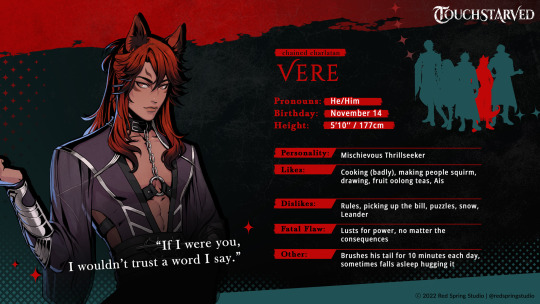
#character bio, character/narrative descriptions
2-word character description at the top again paragraph 1: establishes their role in the world, general disposition and reputation, a hint of their deep secrets & a subtle hint at what core issue plagues them (thing that defines their arc) paragraph 2: what they want/how they interact with you (core issue style), ends with their narrative question (the implied yes/no that determines good or bad ending) [ex: can you redeem him, or are you the final entry in a long list of tragedies?]
captions: restates implied core struggle & narrative question [Some people are beyond saving. Ais teeters on the brink of the abyss… Can you help him or will he drag you under? / Many Monsters lust for blood, but Vere promises to protect you. His collar prevents him from harming humans… But can it contain his deadly appetite?]
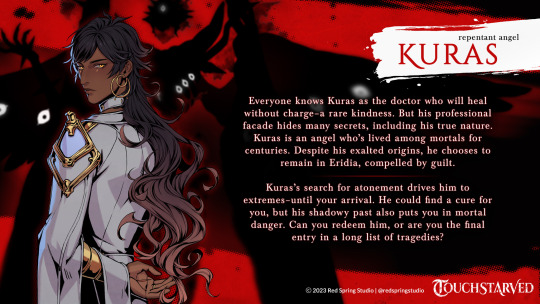
#relationship chart:
close/like/dislike arrow to each character, plus a two-bit blurb on how they think or feel about them. [ex. Mhin's only friend. As much as Mhin wants to trust him, they're afraid of being hurt. Or worse.] also have a little quote about how they view others/the nature of relationships [ex ais: "not bad to be the black sheep. you get the clearest view of the world" / kuras: "friends are fleeting, but no less precious for it"]
captions: posted twice, once with a caption that summarizes their general social attitude, followed by an engagement question [Kuras doesn’t mind most people… except Vere. They certainly have some kind of history, but do you have any theories as to what it is? 🤨/ A certain spoiled pup is missing from Ais’s chart… 🐕 How did your MC react to meeting Princess in the demo?] and once with a caption that summarizes their reputation, followed by a somewhat surprising tidbit [To stave off his constant boredom, Vere causes trouble all over Eridia 🧨 He’s likely the culprit behind several local ghost stories…/Leander gets along with everyone and he's extra frisky when drinks are involved 🍻 Despite his popularity, he doesn't have any close friends…]
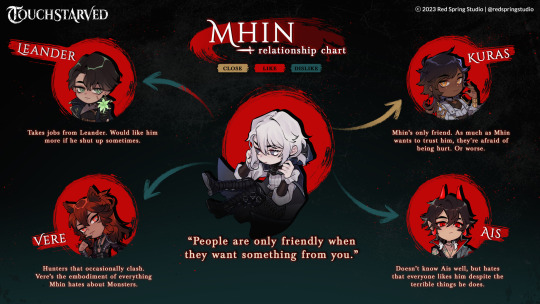
#stat chart:
stats: 1-5 for strength, luck, and wisdom, followed by 2 character-specific notable stats at the bottom [ex. forbidden magic, rizz / animal handling, small talk / empathy, handwriting] blurb: abt one sentence, describes their typical behavior & maybe hints at some stuff [while more than capable in a fight, leander avoids unnecessary bloodshed to uphold his spotless reputation and to protect his handsome smile // Ais is a man of many talents, adept in the fine arts of bashing skulls, intimidation, taming wild beasts into submission, mastering long-dead tongues, and murder // thankfully, kuras is more interested in helping than harming others. his true power is almost as unfathomable as his handwriting // for decades, vere has left the remains of the drunks, swindlers, and amateur thieves that mistook him for an easy mark on the doormat of kuras's clinic // mhin may be short-tempered, but their sharp tongue and propensity for violence bely their wealth of knowledge]
captions: memey summary of their personality/habit they have [If Mhin wants to recite the entire Bee Movie script to you, it’s basically a love confession 🥰 If you say no, you will get stabbed / Many a drunken brawler has taken Vere for an easy mark, but his pretty face belies a shockingly high body count 🔥 / Wow, Ais is so talented… We love a guy who can give people a good pounding 👊🤯💥 in a fight]
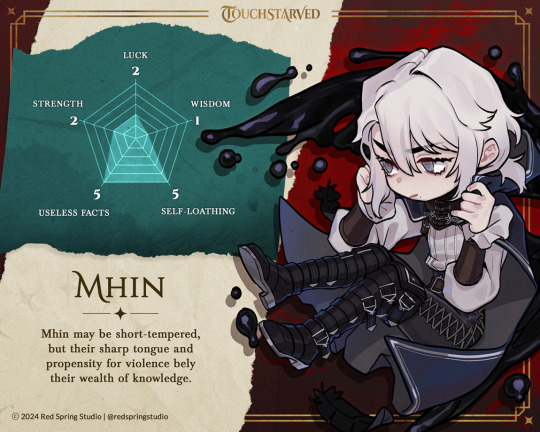
#character lore
a) sentence that establishes relevant worldbuilding, followed by b) elaboration on it that doesnt explicitly mention the character; then c) some extra detail (sorta a climax; most significant info) -> d), a short resolution that implies a direction for the relevant lore subject
ex:
a, relevant worldbuilding) Mhin: in a bygone era, before eridia became the last bastion of humanity, there was Lovent / Leander: Visitiors drawn to eridia are often surprised by the senobium's apathy towards the surrounding city / Kuras: the senobium's folklorists note a curious pattern in humanity's oldest tales.
b, elaboration) yet where a bustling metropolis once stood, there is now only a blasted crater and empty ruins, blanketed by fog. / Lacking the senobium's protection, Lowtown has been divided into territories belonging to several gangs. / Though the details vary, these stories share a common theme: an otherworldly teacher, bringing the divine gift of knowledge.
c, most crucial info) the inhabitants, and large chunks of the city, had vanished into thin air. / While a significant portion is watched over by Leander, he refuses to stoop to bribery or senseless violence to maintain his power. / Alchemy and literacy, art and war...supposedly this being shared all they knew with the earliest civilizations.
d, direction) over the following years, scholars flocked to the ruins in earch of answers. like the loventians, they disappeared without a trace, and none ever returned. / locals speak praise for the charming leader whose seemingly benign reign extends even below the city streets into the shadowed depths of the Silent Crypts. / In some tales, the otherworldly teacher is a loving, benevolent figure. In others, they are a harbinger of chaos and ruin.
Captions: relevant quote from the character [not all seen in game so far. ex “Obedience suits you, sparrow.” / “Hope. A strange concept, after so long seeing myself as the agent of ruin.”]
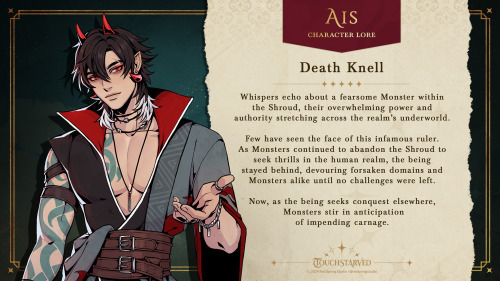
#touchstarved game#will this make me make character sheets? lets be real probably not. but i had fun
77 notes
·
View notes
Note
What's Sasuke and Karin's friendship like?
i can’t tell if you’re asking me for hcs or use canon? anyway i guess they both the same anyway because i don’t like changing stuff. so yeah they are a very subtle friendship since karin is a side character and not meant at the center of sasuke’s arc the way itachi and naruto are but i still find them very precious.
like imagine you’re karin and you have no family and no village and you’re basically the lab experiment of some freak and there’s this boy that saves your life and is the only person kind to you (you can notice is taka’s interactions sasuke defends karin from suigetsu which i find really nice of him). it makes perfect sense to me karin grows very attached to sasuke. he’s also the one to kill her abuser (more because orochimaru is his abuser as well but yeah) and free her of duty, and trusts his back to her. the way jugo tells sasuke they have to leave karin behind because they won’t make it otherwise but sasuke stands his ground and does everything to save her it’s so telling and debunks any argument people have of sasuke just seeing her as a tool.
in fact, i find hilarious ppl use him stabbing karin at 5ks as their proof when the whole point of that scene is seeing how far gone sasuke was and his mental instability when faced against the responsibility for itachi’s and his clan massacre that he ended up hurting a friend that gave all to help him. obito literally calls karin sasuke’s favorite out of taka during that fight, do people just assume kishimoto added that for no reason? but anyways back to them. i also love that despite his crush and flirting, karin also can talk back to sasuke and isn’t meek. she isn’t scared to call him out when she wants to. sasuke also apologizes to her and ik shippers of all kind love to say he didn’t mean it but there’s no indication he wasn’t sincere unless you try to push an agenda lol. i also love that sensing sasuke in danger got karin to unlock the uzumaki chains technique so she could get to save him, it shows how much she cares (and it kinda parallels him saving her during the killer bee fight). and lastly karin just wants sasuke happy like for all her crush can be annoying at times she really cares more for sasuke’s happiness than “winning” him and doesn’t try to generate pity with her feelings to get him to stay with her and i think that’s why sasuke doesn’t find her annoying lol.
so to summarize it, i adore their friendship even if it’s not in your face and you have to pick it up. i think they care about each other and like each other presences. i can also see them bonding over their traumas being victims of orochimaru’s grooming and being understanding. i like to think even after moving on from her crush karin still acts clingy and annoying w sasuke but instead of being confused like before he just now is like Whatever and lets her because they both know it’s not serious.
#ask#i still need a tag for themm#my fave sasuke bond after ns and uchbrothers trulyy#they were done really dirty for many translations also i found some analysis talking about it its just sad that only sk cared#this is late as always im sorryy
57 notes
·
View notes
Text
Obviously we're all aware of this tweet by now, and tbh, considering that we've now seen Mastermind, the only possible 'significant arc' I can think of that they might be referring to has to be something along the lines of getting Stolitz on the same page as each other.
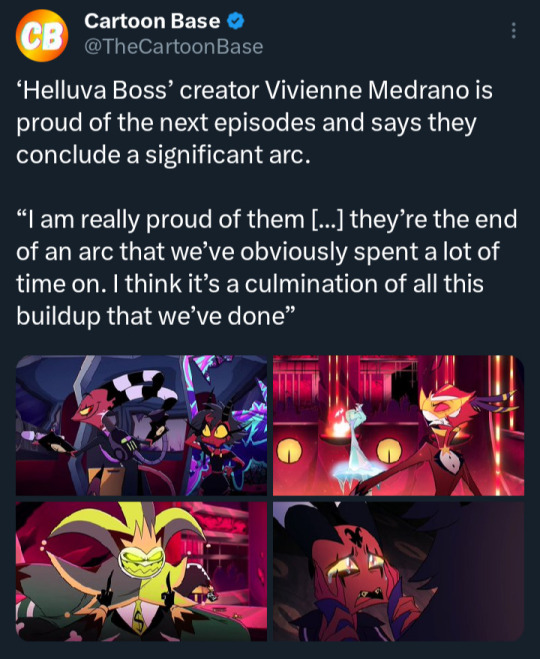
Before any of you mention the divorce at all, it is definitely not that, Andrealphus literally says that Stolas is Stella's ex-husband at the start of the episode.

To save time I'm just gonna skip over to Ghostfuckers and Mastermind, but to summarize things a little simply, do remember that even the start of season 2 had a focus on getting Stolitz on the same page as each other, by showing us the start of Stolas getting the Asmodean Crystal for Blitz, aka, getting rid of the grimoire arrangement that was preventing them from ever being able to be on same exact page as each other. With the grimoire arrangement coming to a true end on s2 e8.

With that out of the way, let's discuss this scene.
I hate to break it to you if you're not already aware, but Stolas and Blitz did not hear each other during this part of the song at all, what we actually witnessed was a soliloquy.
Which is defined as by the Cambridge dictionary: 'a speech in a play that the character speaks to himself or herself or to the people watching rather than to the other characters'.
Which as a result, while it definitely moves Stolitz much closer to being on the same page as each other, they still aren't fully on the same page as each yet, Stolitz is not fully canon at this point in time, but will be very soon.

Let's break down where this scene leaves us, for Blitz, we're definitely at the point where he has realized and accepted his own love for Stolas, with the best lines I can think of to showcase this point being "The bird got to you that bad, huh?" and "Only death can rend our love apart!".
Blitz has also recognized and accepted the fact that Stolas loves Blitz back as well, with the episode making this extremely clear. The most obvious point of the episode that shows this is the moment when Blitz makes the conclusion that Stolas is going to sacrifice himself in order to save him. Because well, what says 'This person truly loves me' to someone more than 'This person is literally about to sacrifice himself in order to save me.', especially with the heart pupils as well, which overall, puts Blitz into a position where he thinks it's possible to have a relationship with Stolas, and wants one with him as well.

As for Stolas, it's made extremely clear that he recognizes and accepts his own love for Blitz, as the entire soliloquy section of the song shows.
But the key difference between them is the fact that I'm pretty sure that Stolas hasn't realized Blitz's own love towards Stolas at this point in time, which in all honesty, makes this scene pictured below hurt even more.
What I'm trying to say here is that Stolitz is still not on the exact same page as each other yet in regards to their relationship with each other, they're close, but not quite there yet.
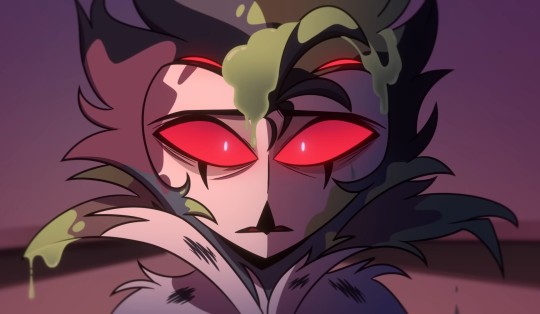
Which is where Sinsmas comes into play. You all have seen this scene a million times by now in posts, but I really do feel like this is going to be the scene where Stolas starts to realize Blitz's own love for Stolas.
Because well, what says 'This person truly loves me' to someone more than 'This person is actively putting themselves into mortal danger by fighting against a royal demon in order to protect and save me.' (I could've sworn I used a very similar phrase earlier in this post, surely you can figure out why?)
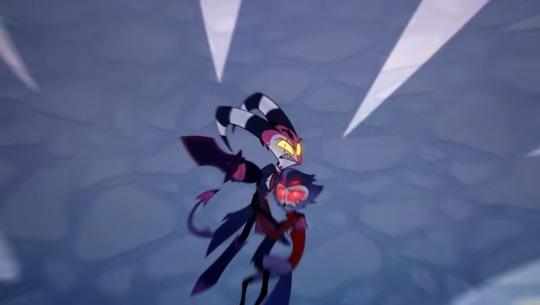
And I'm pretty confident in saying that this scene definitely is not a dream, as I'll let @lost-romantique's post explain for me.
Basically, we're at the last page of the book, the last section of the arc I mentioned at the start, we're so close to Stolitz actually being on the same page of each other in regards to their relationship, we're so close to witnessing the whole miscommunication trope thing between them end, we're so close before we get to see the renewed and bettered start of Stolitz again.
Because let's be real, for all of the reasons I have mentioned here, there's absolutely nothing else I can think of that's being going on for the whole season that would count as a 'significant arc' over than the one I mentioned at the start of this post.
#helluva boss#blitzø#blitzo#stolas#stolitz#helluva boss stolas#helluva boss andrealphus#stella goetia#helluva boss analysis
81 notes
·
View notes
Text
Yk that post that's like ‘signal is the spiritual successor to nightwing’ bc I DO & IVE BEEN THINKING ABOUT IT NON-STOP.
And the comics pretty much confirm it (To Me) in Grayson #15.
So in this issue each of the Robins, minus Steph (RIP Steph) get paired off with one of the We Are Robin gang and give them their own advice on what it means to be Robin.
Tim—whose main problem with this whole thing is that they don't know these kids, how can they trust them?—gets paired with Andre Cipriani, a mob kid whose dad was murdered by a rival gang when he was eight years old. Tim trains Dre by having him fight blindfolded. He tells Dre that being a Robin is about truth and investigation, which makes sense, right? Tim became a Robin by figuring out Batman and Robin’s secret identity (keep this in mind, all the Robins’ advice links to their origin).
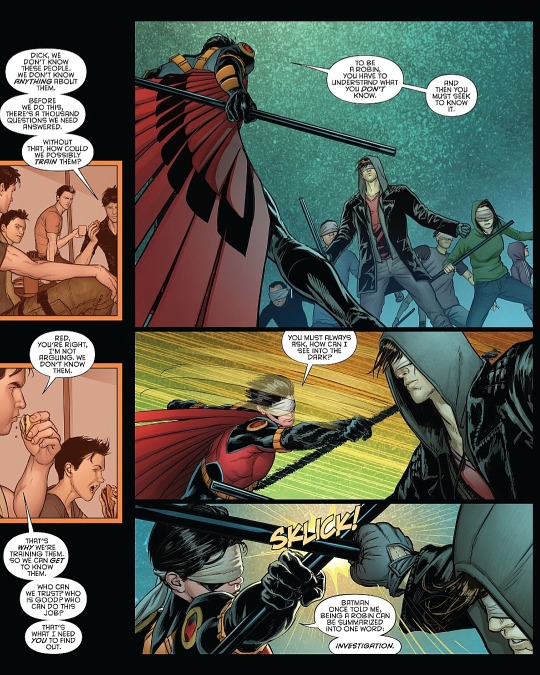
To be a Robin, you have to understand what you don't know. And then you must seek to know it. You must always ask: how can I see into the dark? Batman once told me, being a Robin can be summarized into one word: investigation.
These two were an interesting choice to pair up. I would've thought they'd put Dre with Jason, given their violent tendencies—Dre is smart, but at this point in the comics doesn't strike me as particularly investigative. Then again, right after this arc he goes undercover in a gang, so maybe he learned something?
Speaking of learning something: at first I thought they should've paired Dre with Steph (#teamcriminaldads lmao), and while that would be an interesting team, Dre did learn from Tim. If Riko were present in this issue, she would've been a good fit for Steph, as she idolizes the Batgirls and Steph was both a Batgirl and a Robin. Plus, Steph and Riko are both brave & have mean streaks, something that Riko has trouble showing because of her shyness. Steph’s advice probably would've been along the lines of “being a Robin is about defiance”.
Besides, if Tim and Dre weren't paired up, we never would've gotten this interaction.
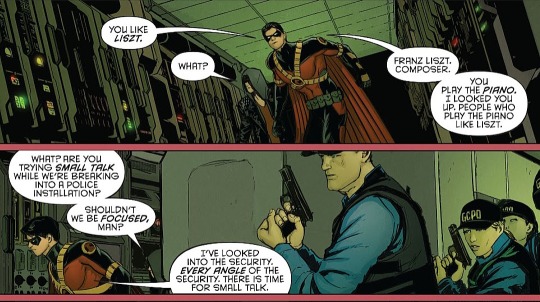
— You like Liszt.
— What?
— Franz Liszt. The composer. You play the piano. I looked you up. People who play the piano like Liszt.
Points to Tim for the most autistic small talk ever. ‘You like this, which I know because I researched you in a totally non-creepy way.’ Amazing. 10/10.
Dax gets paired with Jason. They're interesting parallels. Dax is the inventor/mechanic of the team, but also sort of the wild card with very strong morals, like Robin!Jason in a way. Like Jason, Dax’s father is (implied to be) a crook, though they took different moral directions because of that—Dax is completely opposed to gun violence.
Anyways, Jason's main reservation is that you can't have Robin without Batman. And I guess he decided to solve this issue by just becoming Batman & making the WAR crew relive his origin story by stealing tires from the mob.
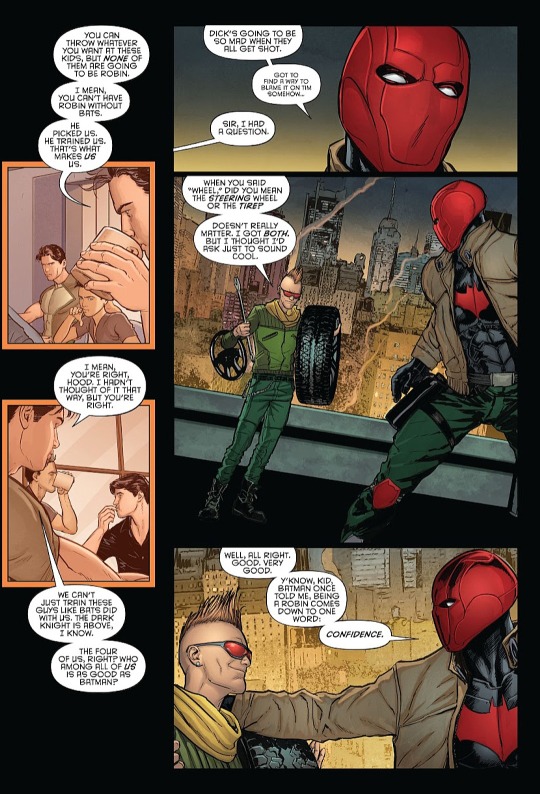
Y'know, kid, Batman once told me, being a Robin comes down to one word: confidence.
Jason Todd, the Crime Alley street kid who had the balls (and the skills) to steal Batman's tires and get away with it. Sort of. Confidence, indeed.
Damian's problem with the Robins is, of course, that they're weak, and strength (according to him) can't be trained; you either got it or you don't. He gets paired with Izzy, who probably has the toughest home life of the WAR crew. Her brother's in a gang (that he regularly beats her up for not joining), and she's failing all her classes because she's too busy working night shifts at her mom's restaurant to sleep or do homework.
So Damian's advice to her is pretty apt:
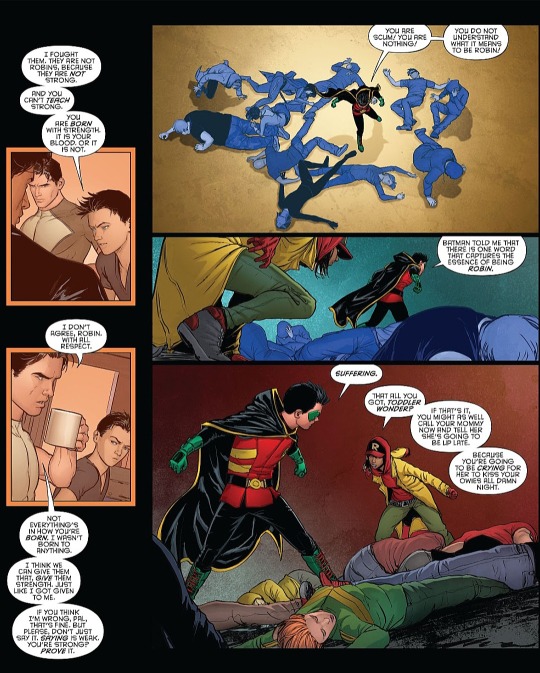
Batman told me that there is one word that captures the essence of being Robin. Suffering.
Damian and Izzy are both outwardly surly, stubborn characters who have had to fight to survive. Notably, Izzy is the first of the crew to almost resort to killing/guns (in WAR #6). She's also probably the best fighter in the WAR crew after Dre and Riko. She does dancing, gymnastics, judo, and kick-boxing.
And, finally, we reach the point of this whole post: Dick & Duke.
Duke deduces Dick's secret identity in like .5 seconds.
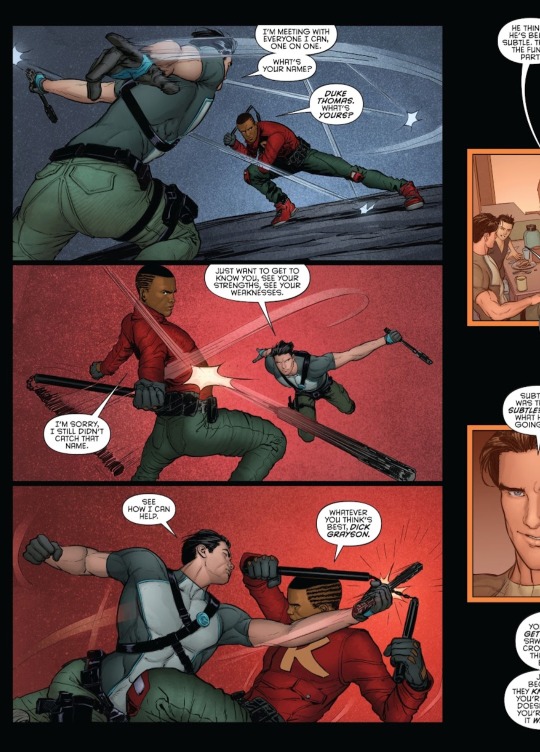
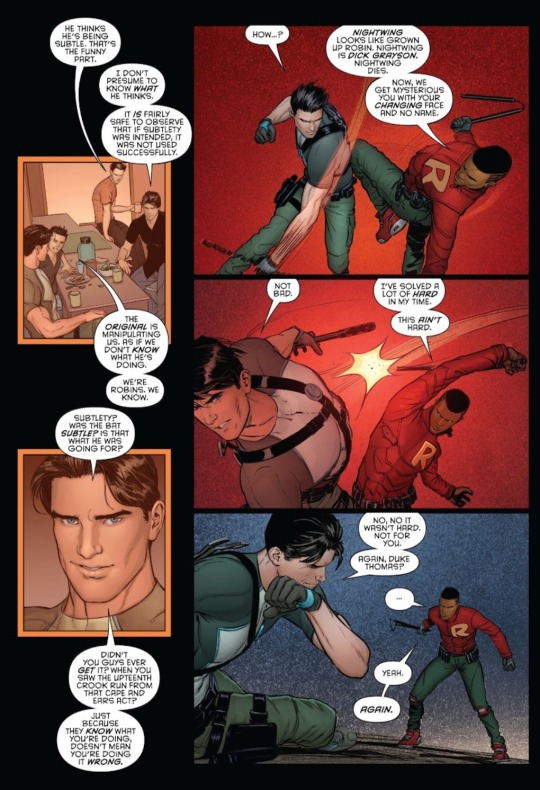
— I've solved a lot of hard in my time. This ain't hard.
— No. No, it wasn't hard. Not for you. Again, Duke Thomas?
Dick: You discovered my secret identity!
Duke: What? Like its hard?
After scoping out their strengths and weaknesses, Dick sends the Robins on individual assignments: Dre and Tim to investigate, Dax and Jason to cause a distraction, Izzy and Damian to apprehend Robo-Batman/Gordon.
Dick brings Duke on to a roof for a stake-out, where they have this exchange.
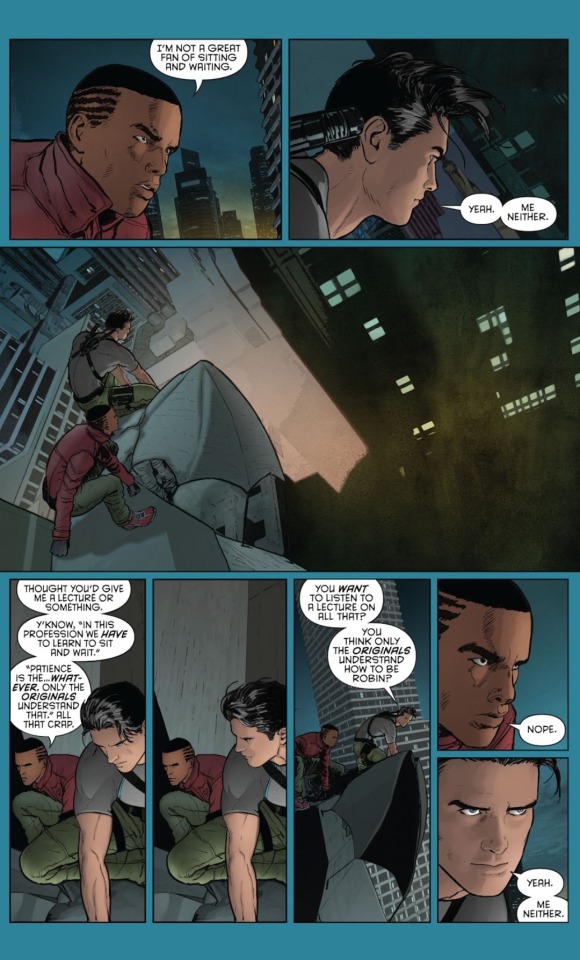
— You think only the originals understand how to be Robin?
— Nope.
— Yeah. Me neither.
Then it turns out that Dick actually turned them all in to the cops because he wanted them out of harm's way. He's been watching Duke for a while and he knows he's scared of heights, so he led him onto a roof he knew he couldn't get off of. Just before they part ways, Dick imparts his Crucial Robin Advice:
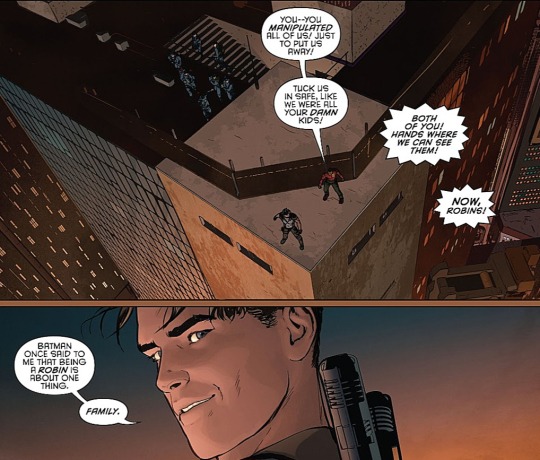
Batman once wais to me that being a Robin is about one thing. Family.
(I find this whole thing super ironic considering Dick's whole aside concerning the Robins was the fact that it doesn't matter if people know you're manipulating them as long as it works.)
The point of Robin? Family. Dick and Duke are alike in this way. Dick only became Robin to get justice for his parents’ murder. Duke only joined WAR to find his parents.
Their origins and motivations are similar, and so are the characters themselves. Dick is often called the world's second-greatest detective next to Batman himself. Duke is a child prodigy—one of our first introductions to his character is when he tried to solve the Riddler's riddles in Zero Year. He loves puzzles. He's an amazing detective.
And, of course, one of the things we know and love about Nightwing is his inherent kindness, something that's present throughout Duke’s entire character arc. Even their hero names, Signal and Nightwing, are parallels of each other (light and dark). Batman’s first sidekick and his last. And, like Nightwing, Signal formed his own team (WAR) with no help from the others (except Alfred ig).
Of course, the entire point of Signal’s character is that he's not just a Robin. He's something different. It reminds me of that post that's like—’poor dick grayson, originator of a legacy he never meant to be a legacy, crushed with guilt and jealousy when he looks at all those who came after’. To me at least, it makes sense that Nightwing’s successor would've never been a Robin at all.
#tumblr ate this post half-way thru so posting was delayed#duke thomas#we are robin#dick grayson#nightwing#dc#andre cipriani#daxton chill#dc comics#riko sheridan#batfam#izzy ortiz#damian wayne#tim drake#jason todd#Stephanie brown#robin war
327 notes
·
View notes